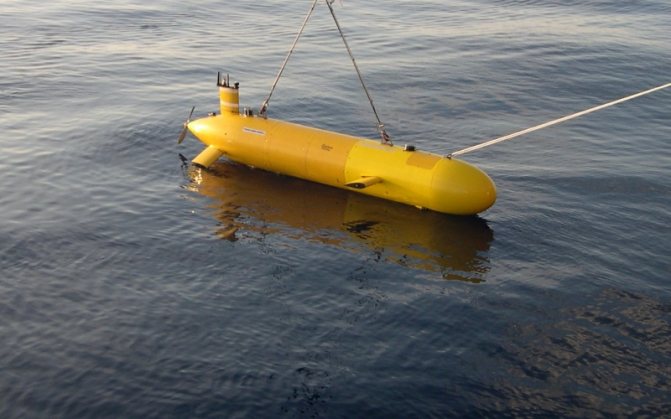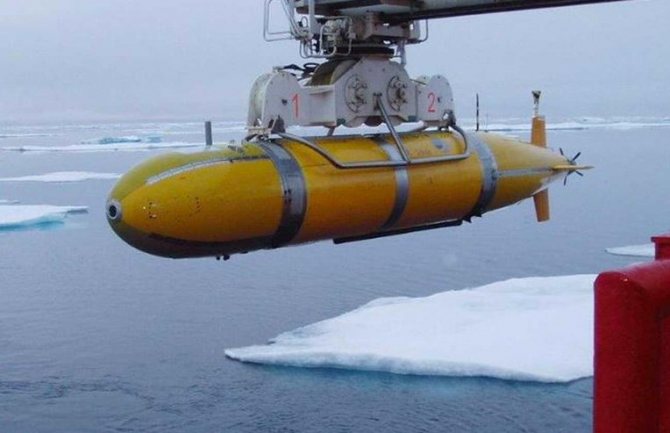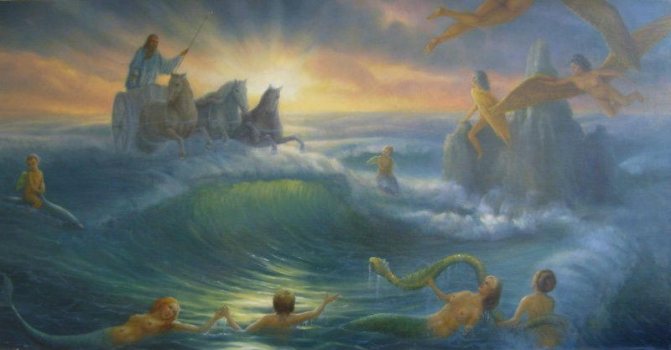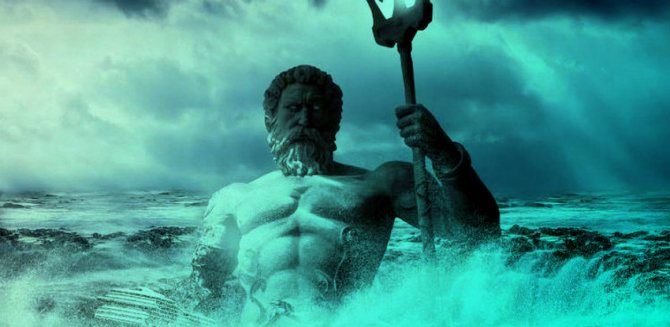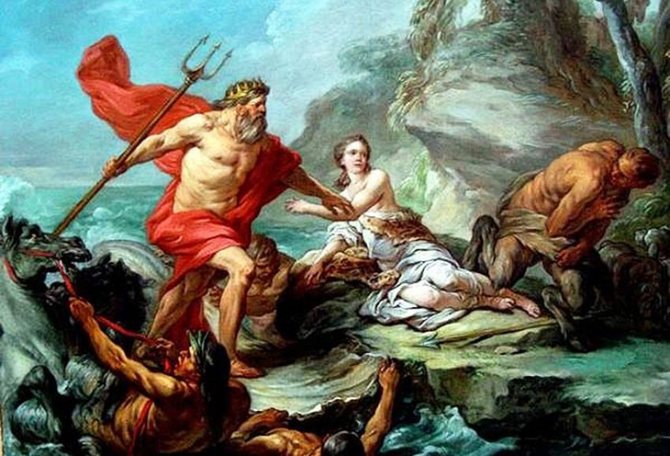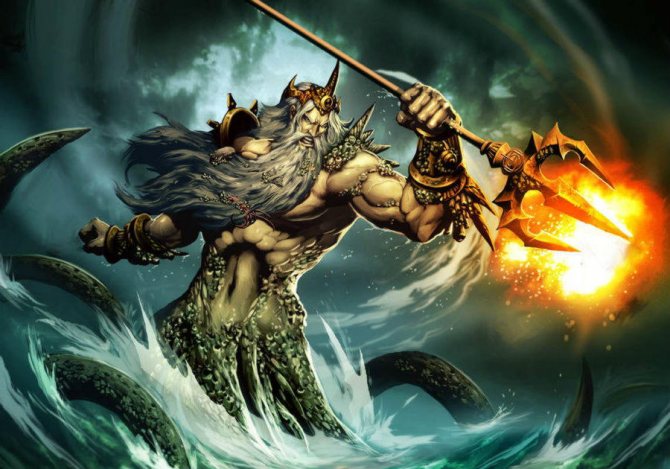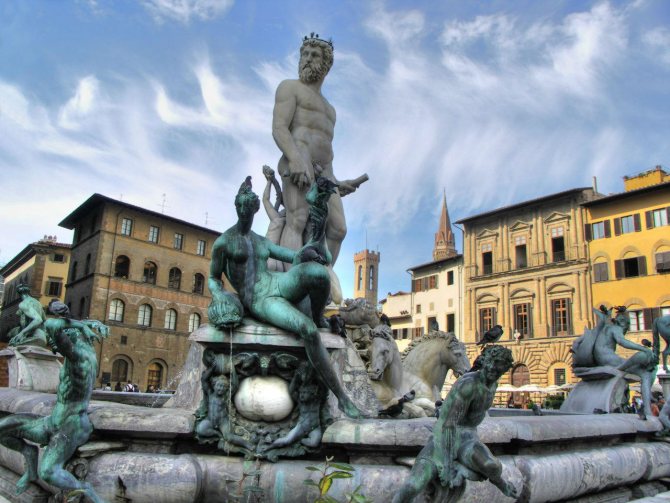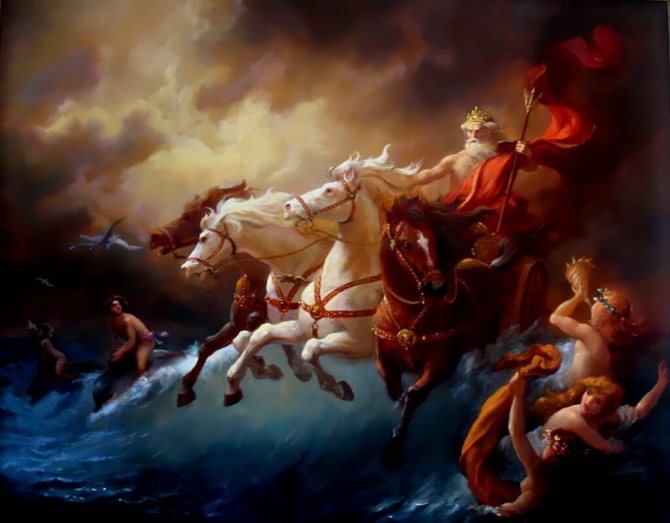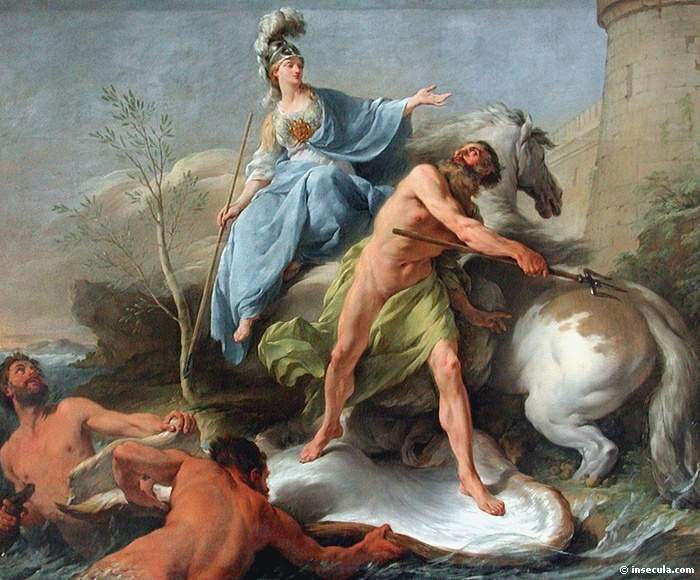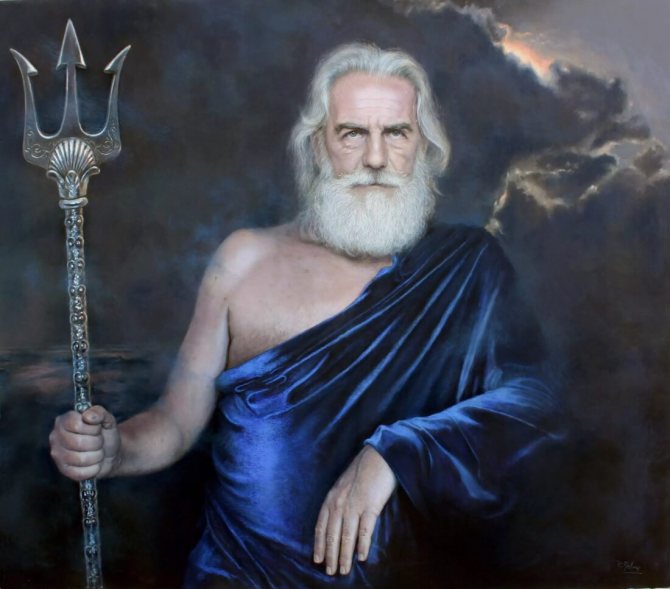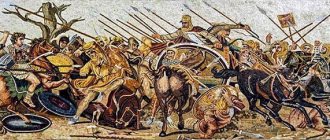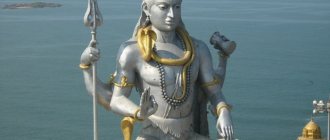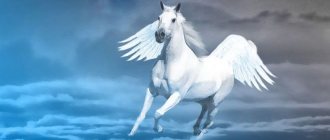Poseidon is one of the most prominent figures in myths. This god was associated with the power of the seas, without which the ancient Greeks could not imagine their lives. As with his elements, Poseidon's temper was unpredictable: anger could be replaced by mercy and benevolence could turn into rage in an instant.
In addition, in honor of Poseidon in ancient Greece, sports competitions reminiscent of the Olympic Games were often arranged. Also this god was the father of many children, because the favor of his lovers Poseidon achieved either by charm or force. What are the bright sides of the character reveal the legend of the lord of the sea?
Russia
Moscow
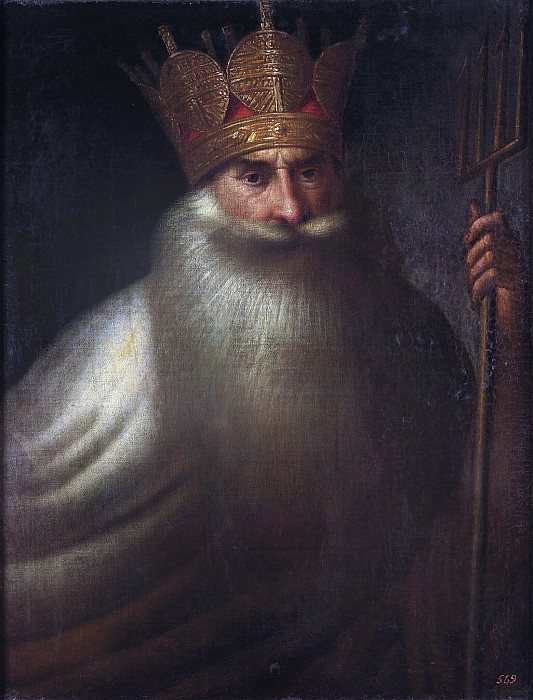
Portrait of an unknown man in a Neptune costume. Unknown author. State Tretyakov Gallery, Moscow, Russia
St. Petersburg
Charles-Louis Clerisseau, a French artist, painted a temple at Pestum (the former colony of Poseidonia). The sanctuary was originally thought to be dedicated to Poseidon, then it turned out to be a temple of Hera.


Clerisseau, Charles-Louis. Ruins of the so-called Temple of Neptune in Pestum. State Hermitage Museum, St. Petersburg, Russia
Lavish feasts were held in honor of Poseidon in various cities of Greece. Paintings of the god Neptune, such as the one below, show the magnitude of these events.
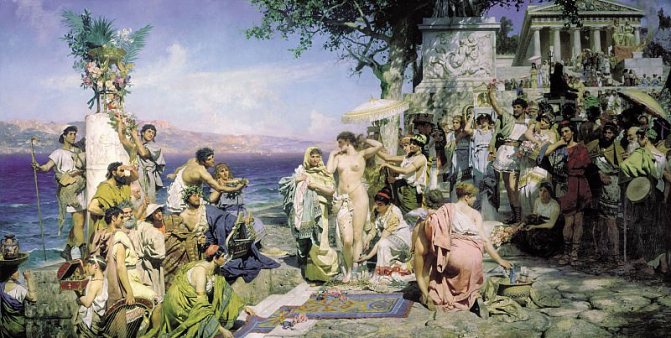

Semiradsky. Phryna at the Feast of Poseidon at Eleusis. State Russian Museum, St. Petersburg, Russia
Theodosia
The sacred animals of Poseidon are horses created by him himself, according to ancient legends. Neptune struck a rock during a dispute with Athena over Attica and the first horse appeared. The god himself was often depicted in a chariot drawn by these beautiful animals.


The journey of Poseidon on the sea. I. K. Aivazovsky. Museum of Aivazovsky. Feodosia, Crimea.
Recommended on the topic
How Myths Originate in Mythology Mielnir Vanaheim
In the morning Polyphemus let his goats and sheep graze, but before doing so he carefully groped each animal and the Achaeans could not get out of the cave. Once again Odysseus was helped by his wit and cunning. At night, when Polyphemus fell asleep, the Achaeans took the skins of the rams and put them on themselves. In the morning Polyphemus let his flock out again, and with the sheep and goats our captives came out into the open.
They could not contain their joy and began to laugh and shout loudly, so Cyclops realized that he had once again been deceived. He rushed after them, but his blindness prevented him from running fast. Then, running to the seashore, Cyclops first began to throw huge boulders into the water and then addressed a fiery speech to his father, Poseidon.
Poseidon responded to his son's request and took vicious revenge on Odysseus and his companions. For almost ten years the king of Ithaca was unable to return home because of the vengeance of the cruel lord of the seas.
Belgium
Antwerp
Neptune's consort is the goddess Amphitriteone of the Nereids, daughter of the elder Nereus. When she learned of Poseidon's marriage proposal, she fled to the other side of the ocean, where she was found by the god's dolphin. Amphitrite is often depicted next to the king of the sea, she too rides in a chariot or on a dolphin.
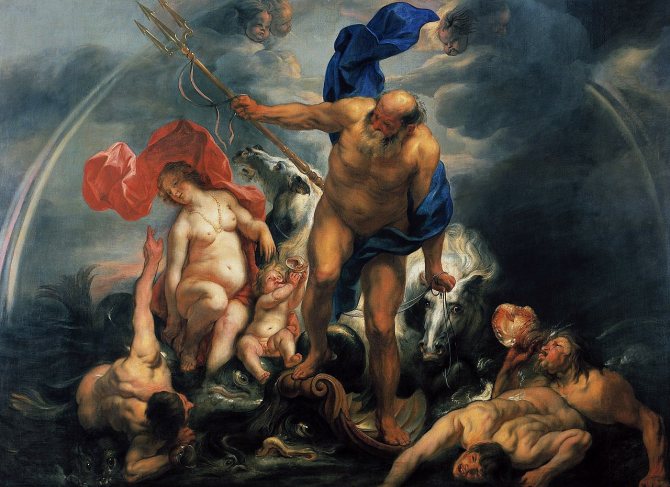

Neptune and Amphitrite in a storm. Jacob Jordaens, 1644. Rubens House, Antwerp, Belgium
Supreme Gods of Ancient Greece
Ancient Greek mythology says that in the beginning the giant Kronos was the ruler of the universe; he was afraid that one of his grown sons would ever try to take over the world and so he swallowed all his newborn children.
One day Cronus's wife Rhea hid her child and gave her husband a stone. This hidden child was the thunderer Zeus, the future ruler of the world. When he became an adult he fought his father and freed all the children who had been swallowed. These were the brothers Poseidon and Hades, and the sisters Hera, Hestia and Demeter.
The brothers divided power over the world: Zeus became ruler of the earth, Poseidon ruled the seas, and Hades was king of the underworld. Before Poseidon (or as the Romans called him - Neptune), the rulers of the seas, rivers and small bodies of water were the Ocean, Nereus and the younger deities, but the powerful and mighty Poseidon pushed them all aside and became the full ruler of the sea and river depths.
Poseidon is not a good deity at all, he has a violent and indomitable temper, like the elements he rules. If the god is angry, the sea begins a terrible storm, ships are crushed on the rocks and reefs, people die. And sometimes the waters, obeying the lord, flood the land where human settlements are located.
In addition, Poseidon controls the volcanic eruptions and with a blow of his trident can cause or tame the revived volcano. His other name is "Shaker of the Earth," and the name Poseidon itself is translated as spouse of the Earth.
Poseidon often rebelled against the will of his elder brother Zeus and even participated in a conspiracy with Hera, who was often angry with his spouse because of his constant cheating, Aphrodite. But the plot was defeated, and Poseidon was saved from death by the sea goddess Fetid. After this he submitted to Zeus, although because of his violent temper and intemperance he often suffered a fiasco.
Great Britain
London
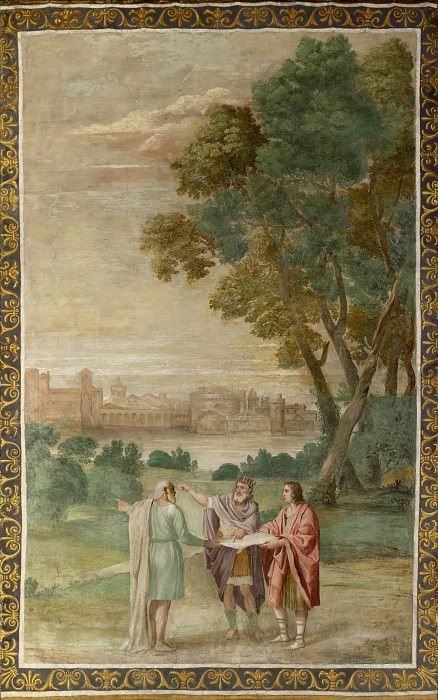

Apollo and Neptune show the way to Laomedon. Domenichino and helpers. British National Gallery, London.
Isle of Wight.
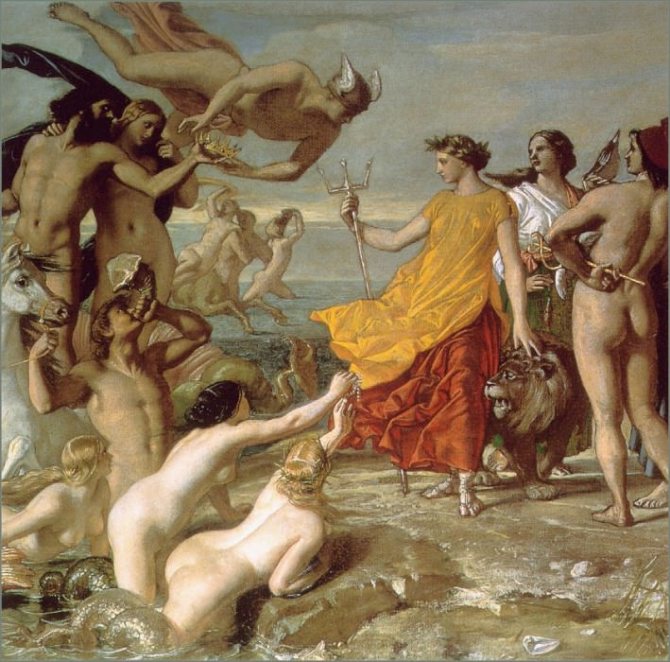

William Dyce. Neptune hands Britain the crown of the Empire of the Seas. Osborne House, Isle of Wight. White
Ares


0
Ares was the son of Hera and Zeus. He was the embodiment of war, not in the form of a liberating confrontation but of senseless carnage. Ares, who had absorbed a part of his mother's chthonic rampage, is considered to be extremely treacherous and cunning. He uses his power to sow murder and discord. The myths show that Zeus dislikes the bloodthirsty son, but without Ares even a just war is impossible.
Germany
Berlin
In a painting by by Ferdinand Bohl again shows the divine couple, Neptune and Amphitrite. The goddess gave birth to Poseidon Triton and other child gods, she also gave birth to dolphins and various sea creatures.
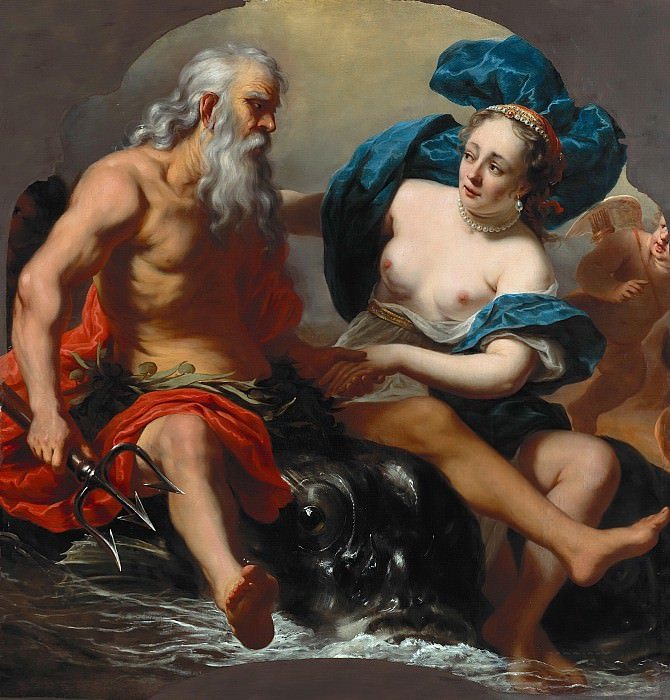

Neptune and Amphitrite. Ferdinand Bol. State Museums of Berlin. Old Masters Picture Gallery. Berlin.
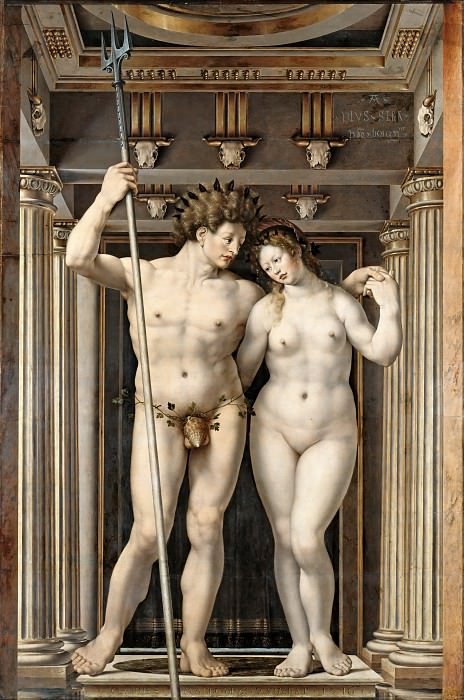

Neptune and Amphitrite. Jan Gossart. State Museums of Berlin. Old Masters Picture Gallery.
Cologne
Jacob de Gein. showed Amphitrite and Neptune in a very beautiful and unusual scene. They are surrounded by mother-of-pearl glittering shells, gifts of the sea. Amphitrite herself is also shown as a beautiful girl, golden-haired and young.


Neptune and Amphitrite. Jacob de Gein. Walraf-Richartz Museum, Cologne, Germany.
Munich
В New Pinakothek has a painting depicting the sea end of Poseidon. They are the waves themselves that roll ashore.
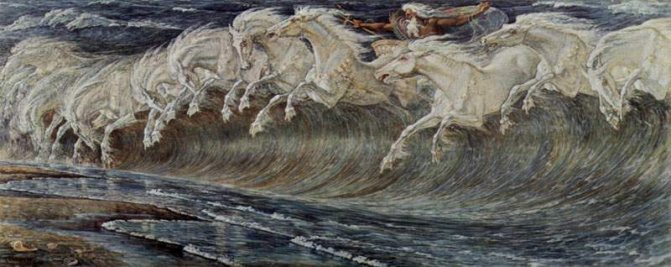

New Pinakothek, Munich, Germany
Recommended
Loki Aphrodite Thor
Once upon a time the famous Greek hero Theseus conquered the queen of the Amazons, Antiopa, and from their union the boy Hippolytus was born. But he grew up as a gloomy and morose child, and as a young man he avoided the company of girls and did not dream of love. Most of all he loved hunting and solitude. He worshipped only one goddess, the virgin Artemis, to whom he offered sacrifices, but he did not recognize Aphrodite, which made the goddess very angry. The insidious goddess decided to take revenge on the young man for his neglect, and devised a cunning plan.
She instilled an irresistible passion in Hippolyte's stepmother Phaedra, and the woman, mad with love, began to unceasingly pursue her stepson. But the latter scornfully rejected her feelings. Phaedra slandered the young man to Theseus, accusing him of molestation. Theseus was very angry with his son and asked Poseidon to show him the treacherous son.
As Hippolytus was driving his chariot to the sea, the lord of the sea ordered the huge sea-monster to appear on the surface of the water. The horses, frightened by the monster, swayed and overturned their chariots, and Hippolytus perished by crashing on the rocks.
Poseidon and Odysseus
This myth answers the questions: Why did Poseidon hate Odysseus so much that he prevented him from reaching the island of Ithaca? Why did it take King Odysseus ten whole years to reach Ithaca?
The cunning Odysseus had not been home on the island of Ithaca for many years because the war against Troy lasted seven long years. But the journey home was also long and difficult. One morning the sailors spotted a green island and decided to dock there to replenish their food and fresh water supplies. Odysseus himself went ashore and with him twelve of his companions, strong and stout men. The others remained on the ship.
As they walked into the interior of the island, they came upon a cave in which large heads of sheep and goat cheese were laid out. Not the least bit embarrassed, our uninvited guests immediately sat down to eat and drink wine. They did not know that on the island the one-eyed Cyclops Polyphemus, son of Poseidon himself and the nymph Toosa, was herding goats and sheep.
In the evening Polyphemus returned to the cave where he lived and where his cattle slept and found the uninvited guests. And the guests themselves were quite frightened by the sight of their host. Polyphemus was very tall and had great strength. Cyclom was very angry and, in addition, hungry. He blocked the entrance to the cave with stones, grabbed one of the Achaeans, threw him into a cauldron of boiling water, and then ate him. The next morning Cyclops went out to feed his goats again, and left the captives in the cave. Though Odysseus' companions were strong, even all together they could not push aside the piece of rock that closed the doors of the cave.
In the evening the insatiable Cyclops ate another of the Achaeans. Odysseus realized that they had to somehow get out of the cave before the monster destroyed them all. At night, while Polyphemus slept, Odysseus' companions took a huge log and sharpened it at one end, then stuck the point in the Cyclops' only eye. Polyphemus howled in great pain and began to rush around the cave, but since he could see nothing, he could not catch any of his attackers.
Italy
Milan
Poseidon is almost always depicted as a mature, strong man with a long beard and hair. His main attribute is a trident forged by the Cyclopes during the Titanomachy (the fight against the titans led by Kronos). Sometimes famous figures, whose portraits the artist was painting, were shown in this way.
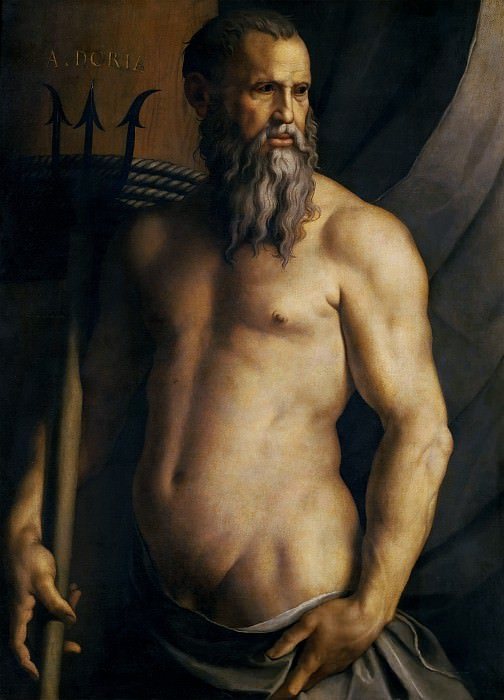

A portrait of Andrea Doria as Neptune. Agnolo Bronzino. 1540-1550. Pinacoteca Brera, Milan.
Rome.
Michelangelo Merisi da Caravaggio - Jupiter, Neptune and Pluto. Casino di Villa Boncompagni Ludovisi, Rome, Italy.
Venice
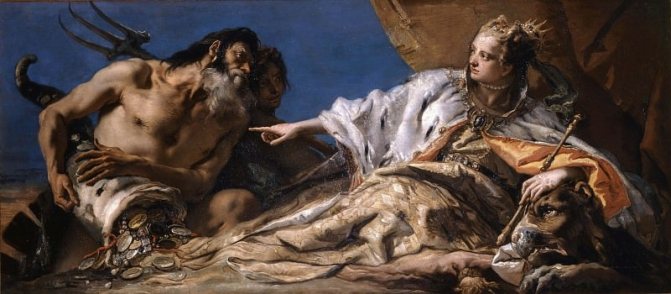

Giovanni Battista Tiepolo - Neptune brings gifts of the sea to Venice. Palazzo Ducale, Venezia, Italy
King Minos and Poseidon
Since Poseidon, like the other supreme deities, was sacrificed, he carefully observed all the details of the rituals performed. On one occasion, a beautiful snow-white bull was promised as a gift in honor of the feast. The sacrifice was to take place on the island of Crete, where King Minos ruled at the time. But when the sacrifice was brought, the bull was so beautiful that the king did not want to give it to the lord of the sea, but decided to keep it for himself. But to Poseidon he gave another bull as a gift.
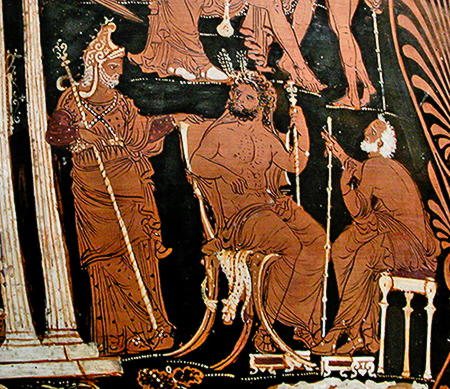

This transgression of course enraged the lord of the sea and he decided to take vengeance on Minos. He persuaded Aphrodite to give Minos' wife a strong passion for the bull. And the latter immediately fell in love with the strong animal. And after nine months the king's wife gave birth to a male child, half man, half bull. To hide her sin from her husband, she hid the child in a labyrinth built by the skilled Daedalus, and named him Minotaur. The child soon grew up to become a bloodthirsty monster who had to sacrifice the strongest young men and the most beautiful girls. And only Poseidon's son Theseus was able to rid the world of this monster.
Interesting: it is believed that the labyrinth built by Daedalus still stands in the city of Heraklion.
USA
New York
The Metropolitan Museum of Art, a famous collection of various works of art, shows a picture of the triumph of Poseidon. He is surrounded by nereids and newts, other characters, and rides across the sea in a chariot.


John Singleton Copley, The Return of Neptune. Metropolitan Museum of Art, New York, USA
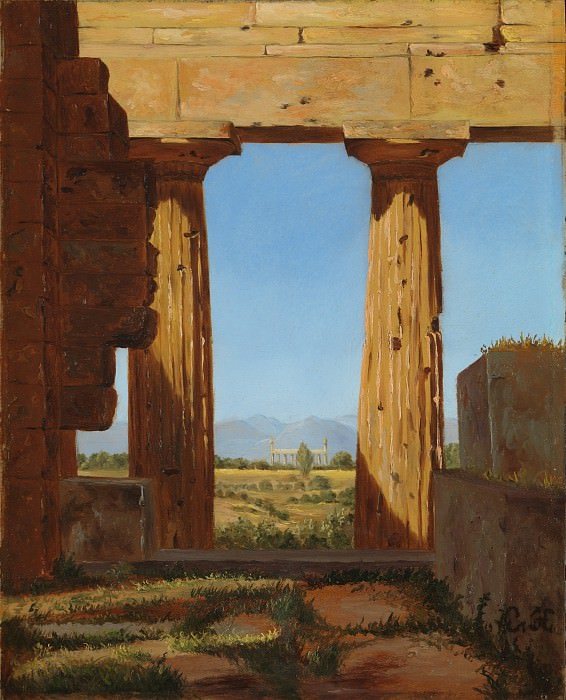

Constantin Hansen. Columns of the Temple of Neptune at Paestum. The Metropolitan Museum of Art, New York, USA.
Philadelphia
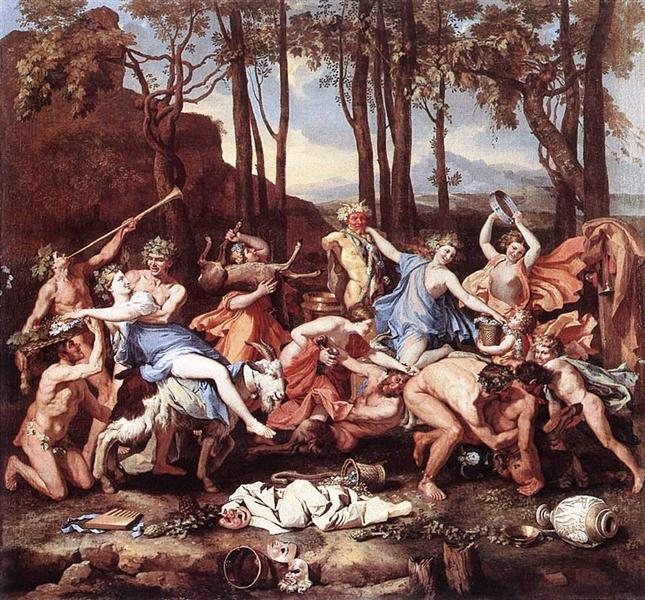

Triumph of Neptune. Nicolas Poussin. Philadelphia Museum of Art. Philadelphia, USA
Harvard
Poseidon was in charge of storms and storms and floods. But he could also calm bad weather, give sailors a calm voyage.
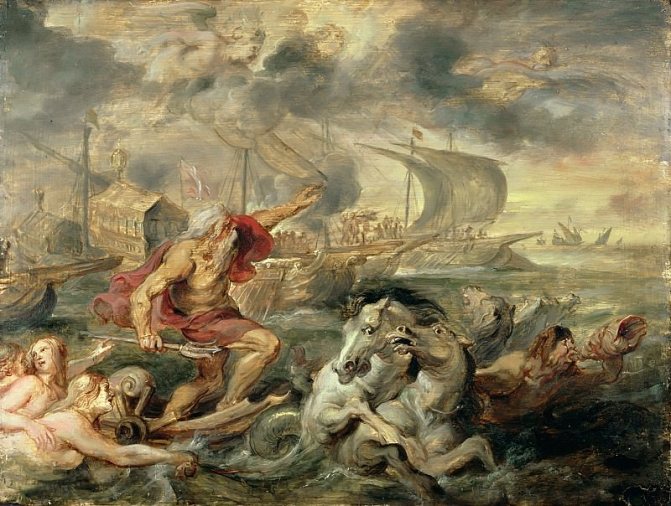

Peter Paul Rubens - Neptune calming the storm. Fogg Museum of Art, Harvard, USA
Poseidon's Women.
Poseidon, like his brother Zeus the thunderer, was very fond of women and he had many adventures with goddesses, nymphs and demigoddesses, even with mere mortals unable to resist the pressure of the lord of the seas. Poseidon is believed to have had five official wives, but this did not prevent him from having constant affairs on the side.
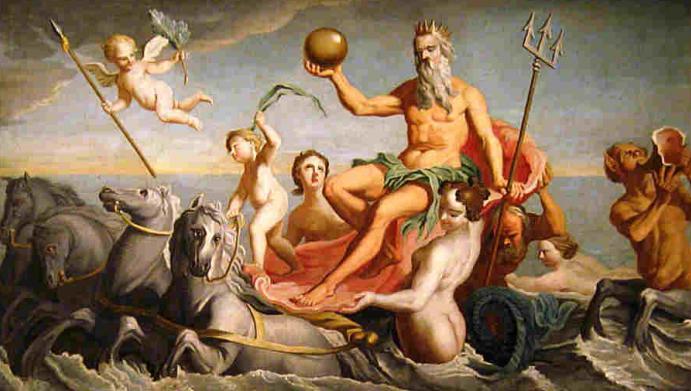

At the very beginning of his reign, Poseidon wanted to form an alliance with the goddess Thetis. But as Zeus also had a claim on the love of this sea goddess, the dispute between the brothers became somewhat protracted and threatened to turn into a war. But Prometheus, who had the gift of foresight, predicted that the son born to Thetis would surpass his father in greatness and glory. Then Zeus gave Thetis away to a mere mortal man, with whom she had cancer, and the great father Achilles was born.
Poseidon was very amorous and his eyes fell on Aphrodite, the goddess of love and beauty. But the capricious beauty escaped from the sea lord and became the wife of the ugly but faithful and devoted Hephaestus.
One day Poseidon saw the beautiful Medusa and passionately desired her. The girl could not refuse the god and gave herself to him in the temple of Athena. Athena was furious at her impudence and turned the beauty into a hideous monster with snakes instead of hair and with a look that turned mortals into stone statues.
Demeter, the goddess of fertility, wandered all over Greece in search of her missing daughter Persephone and happened to come across Poseidon. He developed a passion for her, but the latter, to avoid his love, turned into a bay mare and merged with a herd of wild horses. This did not stop the lord and he, turning into a stallion, caught up with the goddess and raped her.
Poseidon was very amorous, and this gave much trouble to his lawful wife Amphitrite, who as a true goddess, jealous and envious, cruelly dealt with all her rivals.
Tunisia
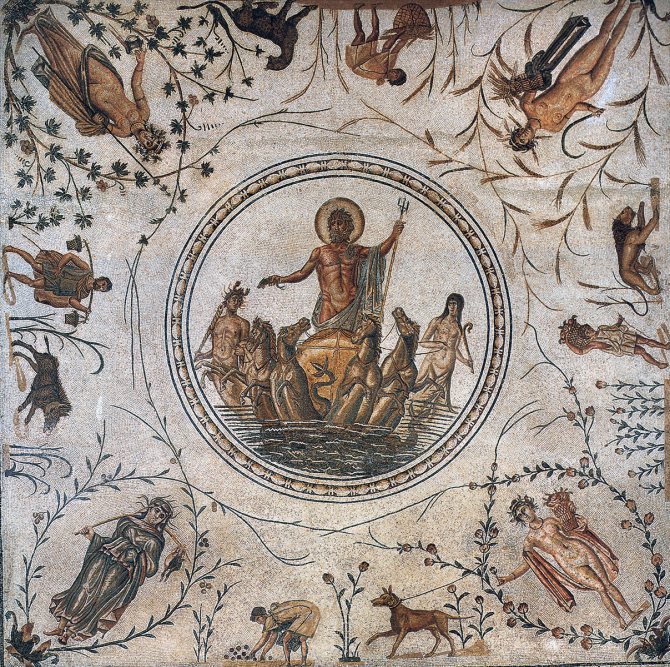

Mosaic. Triumph of Neptune. The middle of the second century. Tunisia
Poseidon was often depicted with hippocampus - water horses, the rear part of whose body was a fish tail.
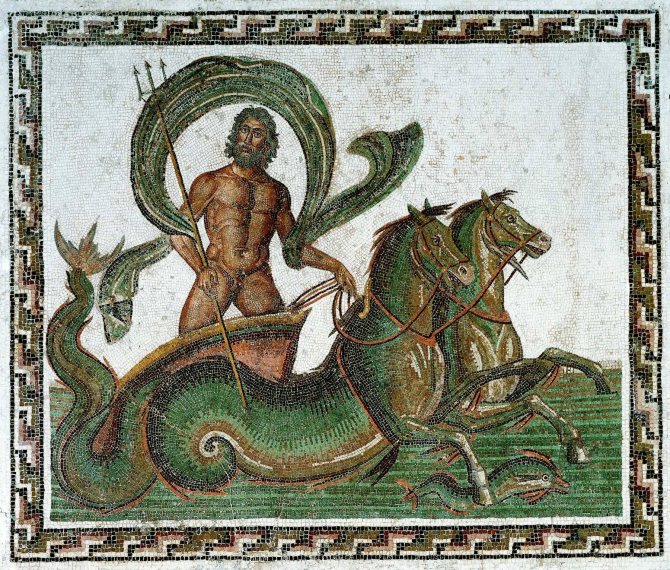

Triumph of Neptune. antique mosaic, 3rd century Archaeological Museum. Sousse, Tunisia
Interesting Facts
- Poseidon is the name of the robot helper from the story "Prisoners of the Asteroid" by Kir Bulychev. The hero was a long-range reconnaissance robot, then was written off and placed at the disposal of Pauline Metelkina, member of the alien section of the Institute of Time, with which he flew on normal planetary flights.
- In the fictional universe of the sci-fi series Babylon 5, the name "Poseidon" refers to a class of spaceships.
- The French groove-metal band Dagoba2 released a studio album called Poseidon in 2010.
- The character Poseidon is present in the multiplayer game Smite, where gods and heroes of various mythologies fight in tournaments.
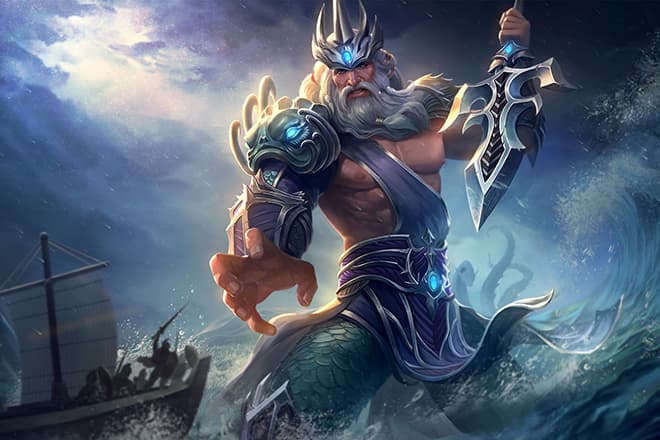

Poseidon in the game "Smite
- The name of the Greek sea god is given to the crater on the moon, which is located in the so-called Sea of Clarity.
- The U.S. military is also fond of Poseidon. There are the Boeing P-8 Poseidon anti-submarine patrol aircraft, designed to find and destroy submarines, and the UGM-73 Poseidon type ballistic missiles, which were placed on submarines. The latter were decommissioned in 1996.
- Franz Kafka has a short story, "Poseidon", where God, in the best tradition of the author, is a cog in the Olympic bureaucratic machine. And Heinrich Heine dedicated a poem to Poseidon, which became part of the cycle "The North Sea.
France
Paris


François Boucher - Neptune and Amimone, 1764. Versailles Palace, Paris, France
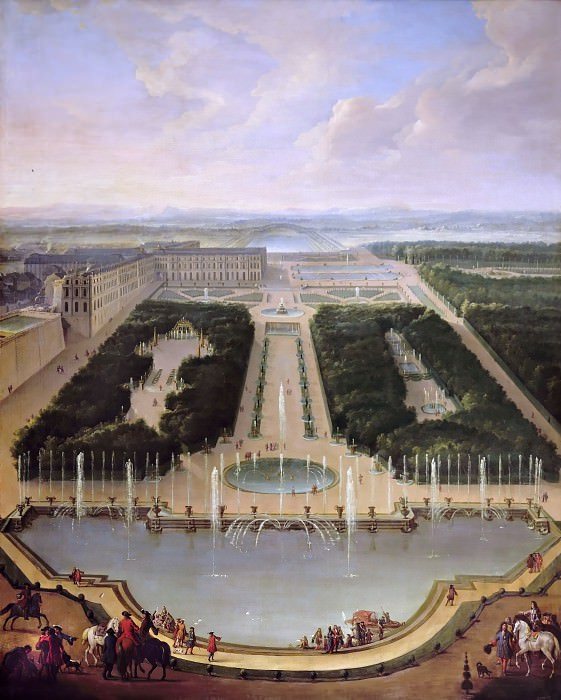

Jean-Baptiste Martin. Fountain of the Dragon and Neptune in Versailles, 1700 Versailles Palace, Paris, France


West Pediment of the Parthenon. Sketches by Jarre Carrey. National Library in Paris.
Tour
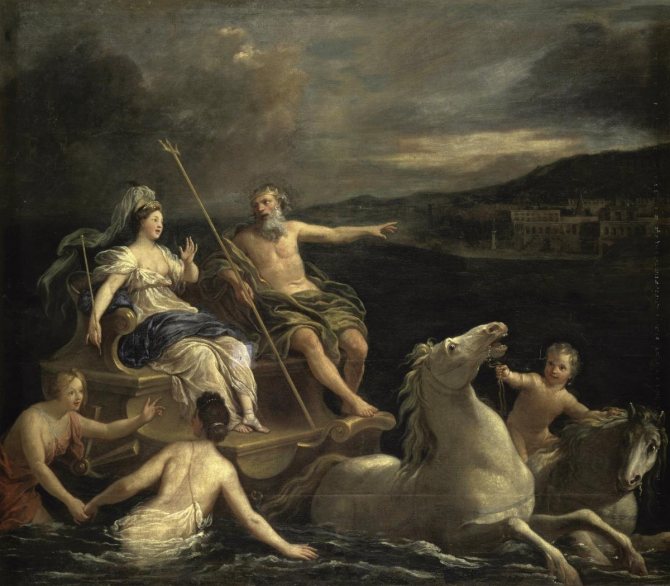

Triumph of Neptune. Bon de Boulogne the Elder, 1699. Museum of Fine Arts. Tours, France
LiveInternetLiveInternet
Quote of post XP0H0METP
Read the wholeBy your citation or community!
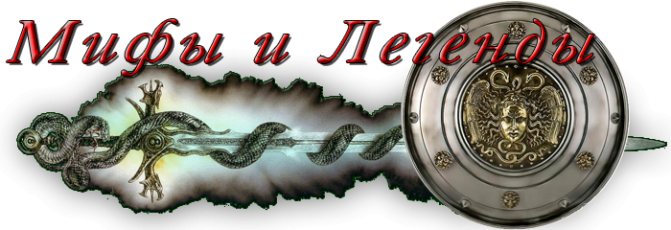

Poseidon (Neptune)
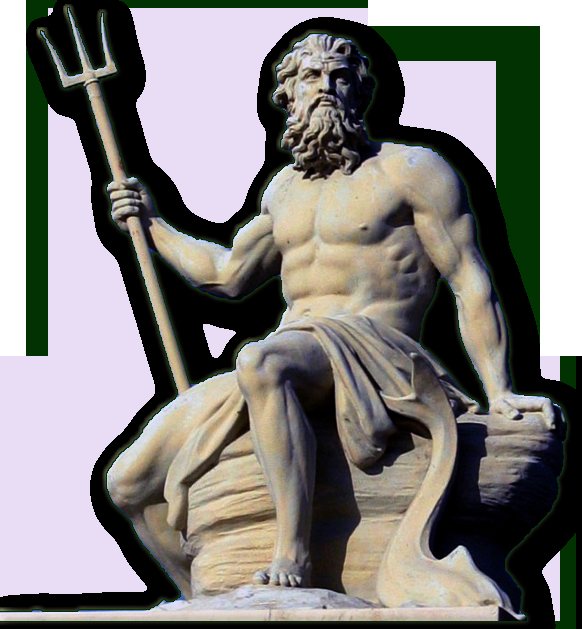

Wikipedia Poseidon, Poseidon or Posidaon (Greek Ποσειδών, Mycenaean. po-se-da-o, Boeotian form Potidaon, whence the city of Potidaea) is the god of the seas in ancient Greek mythology. Second son of Cronus and Rhea, brother of Zeus, Hera, Demeter, Hestia and Hades. He is one of the three main gods, along with Zeus and Hades. At the division of the world he got the sea. Gradually Poseidon supplanted the ancient local gods of the sea: Nereus, Okeanus, Proteus and others. Poseidon with his wife Amphitrite and his son Triton lived in a luxurious palace at the bottom of the sea, surrounded by nereids, hippocampus and other sea-dwellers, rode through the sea in a chariot pulled by long-legged horses, with a trident, which caused storms, smashed rocks, knocked out springs, etc.
Poseidon
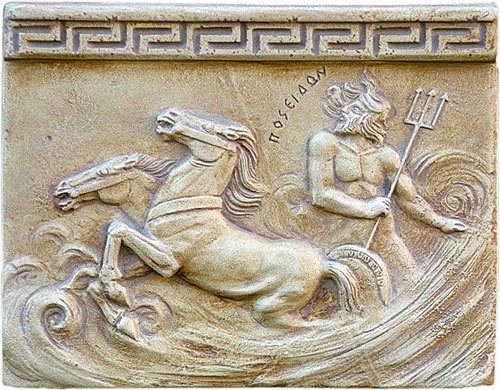

Basic Myths When Rhea gave birth to him, she put him by the spring of Arna in Arcadia to be raised with the sheep, while Cronus said that she gave birth to a foal and let him swallow it. According to the version, Cronus threw it into the sea. Raised in Rhodes by the Telchins. Made a brass door for Tartarus. According to the Cretans, first engaged in maritime work and made ships. There are several legends about Poseidon's dispute over cities with the other gods.
The dispute between Poseidon and Athena (Blondel Merry Joseph)
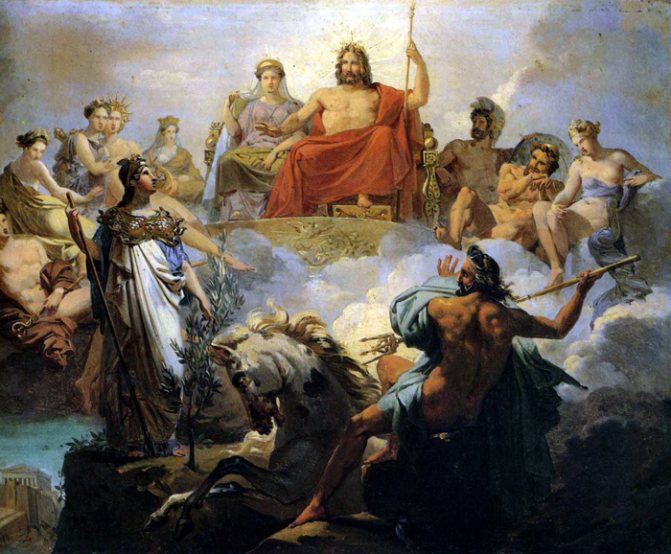

The most famous dispute for Attica is with Athena. Arguing for Attica, Poseidon struck the shore with his trident and produced a horse.
Neptune creates a horse, 1640 (Jordaens)
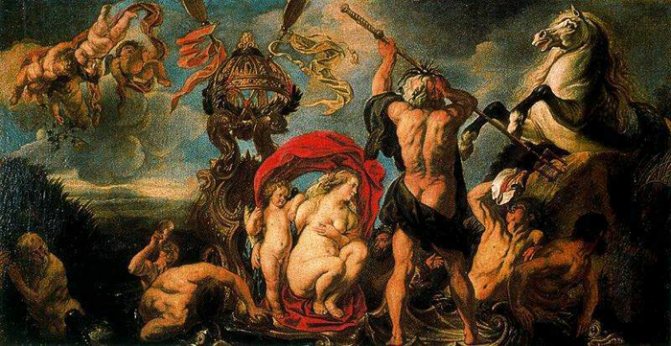

Losing the dispute, he wanted to submerge her, but Hermes, by order of Zeus, forbade it. He also sued Athena for Tresenes, Hera for Argolida, Zeus for Aegina, Dionysus for Naxos, Apollo for Delphi, Helios for Rhodes and Corinth (according to Eumel). All these struggles the sea god lost, of course, except the Corinthian one.
Neptune, 1590 (Polidoro da Caravaggio)
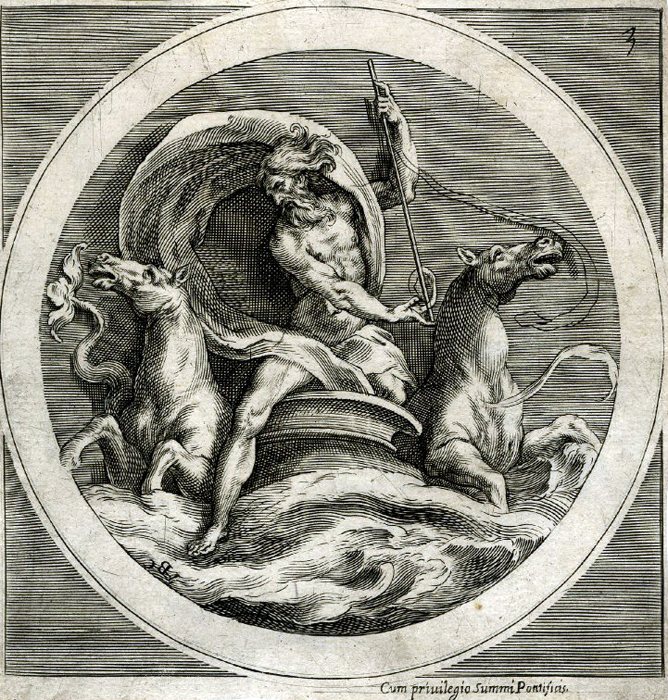

Poseidon was forced to acknowledge the supremacy of Zeus but, considering himself equal to him, opposed it together with Hera and Aphrodite (or Hera, Poseidon and Athena took part in the plot), but was defeated and saved by Thetis. As punishment for conspiring against Zeus, he served Laomedonte along with Apollo. As a punishment he, together with Apollo, erected the walls of Troy, but when King Laomedontes did not pay the money he had promised him, he sent a sea monster over the city that devoured the people. According to Philochorus, Poseidon the Physician is venerated on Tenos, for his temple was erected there according to the oracle of Apollo.
Poseidon (Neptune).
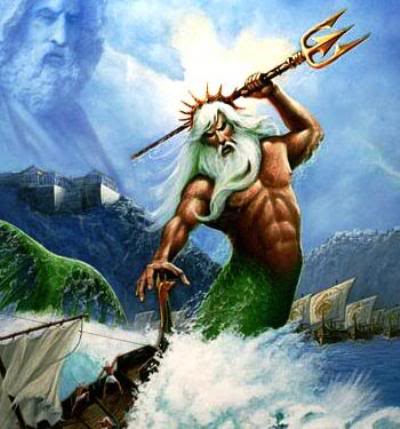

In the Trojan War he was on the side of the Achaeans. With a blow from his trident Poseidon smashed a rock and destroyed Aelid. Then Poseidon persecuted Odysseus for blinding his son Polyphemus. Turned the ship of the Theacians into a rock. Poseidon was considered the patron saint of horse breeding and had the nickname Hippias (the Equestrian). In his honor the Isthmian games were organized, with horse-racing events. The cult of Poseidon was widespread throughout Greece, especially on the coast and on the islands. His temples stood on high promontories and isthmuses.
Poseidon (Neptune) (mosaic)
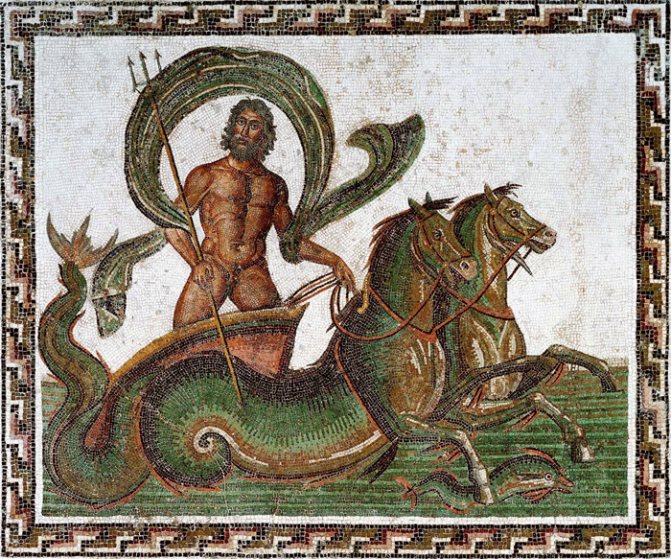

Poseidon's sacred animals were a horse, a dolphin, an ox; his sacred tree was a pine tree. He was portrayed as a powerful man, usually with a trident in his hand. The Romans identified with Neptune, the Philistines with Dagon. Relatives
Union of Earth and Water (Peter Paul Rubens (1577-1640) Hermitage, St. Petersburg)
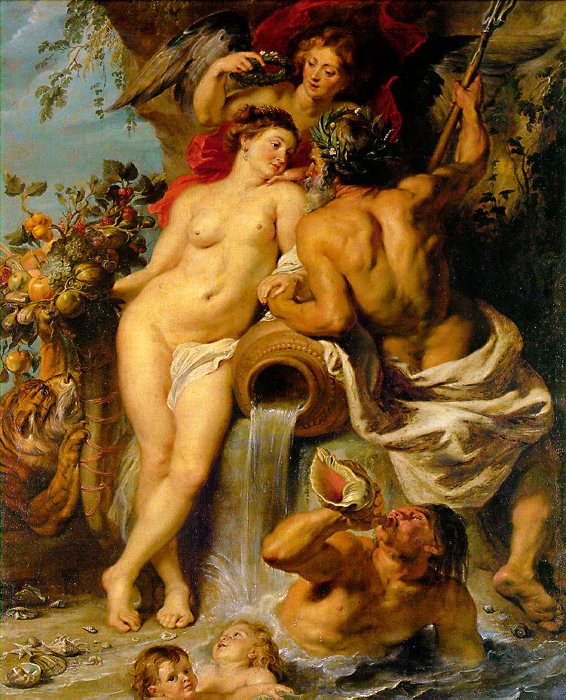

Brother of Zeus, Hades, Hera, Demeter, Hestia. Children
Bellerophonte, Pegasus and Chimera.
Abant. From Arethusa. Abder. From Phronia. (version) Augeus and Actor from Aelida. (version) Agel and Melan. From a Chiosian nymph. Agenor and Bel. From Libya. Aloades (From and Ephialtes). From Iphimedeia. Aloei, Goplei, Niraeus, Triopus and Epopei. From Kanaka. Alphep. From Leidas. Amic and Migdon. From Melia. Amphimar. Ankei. From Astypalea or Althea. Antaeus. From Gaia. Aon. Aret. Arion (horse). From Demeter. Arpreet. (unclear) Asop of Phliasis. From Pero or Kelusa (version). Aspledon. From Midea. Athena. From Tritonida (Libyan version). Achaeus, Pelasgus, and Phthias. From Larissa. Bellerophonte .. From Eurimeda or Eurinoma. Beot and Hellenes. From Antiope. Beot and Aeolus. From Arna, or Melanippa, or Antiope. Briareos. (Version) Busiris. From Lysianassa or Libya. Booth. From Athens (version). Byzantine. From Keroessa. Gales. From Italy. Galirrophius. From Baficlea. Hyperet and Anphas. From Alcyone. Girija, Hyperenor, and Ephusa. From the pleiad of Alcyone. According to the version, also by a certain Efokai. Glaucus of the Sea. From Naida (version). Derkin and Ialebion. From Liguria. Despoina. From Demeter. Dictys. From Agameda. Dyrrhah. From the daughter of Epidamnes. Evadne (daughter of Ithias). From Pitana. Eumolpus. From Hiona or Terpsichora. Euripilus of Cos. From Astypalea, Mestra, or Keleno. Euripilus from Libya. Eurith and Cteat from Elyda. From Moliona (version) Eusir. Euphemus. From Mekionica or Europa (daughter of Titius). Idas. From Arena. Irene. From Melanthia. Iphimedeia. (Version) Cavcon. From Astidamia. Kalavr. Keleno. From the Danaid Keleno. Cenchrei and Lehei. From Pyrenea. Kerkyon. From the daughter of Amphictyon. Cycnus of Troas. From Harpala, or Kalika, or Skamandrodika. Kimopoleia. Crius (ram). From Theophanes. Crome. Lamia. Leucon. From Themisto. Leleg. From Livia. Lycus, Nicæus and Tricon. From the tribe of Keleno. Megareus. From Enopa (version) Minius. From Euryanassa. Navplius. From Amimone. Navsifoi. From Periboea. Nelius and Pelius. From Tyro. Ogig. (version of) Onchester. Orion. From Euryale (version). Paral. Parnassus. From Cleodora. Pegasus And Chrysaurus. From Medusa the Gorgon. Peleus. (unclear) Peon and Edon. From Gella. Perat. From Calhinia. Periclimenus. From Chlorida. Periphyte. Polyphemus (Cyclops). From Phoosa. Polyphemus (lapiphus). (version) Poltis and Sarpedon from Thrace. Procrustes. Proteus. Rhoda and six brothers ("eastern demons"). From Galia. Sikel. (version) Skelmis (telchin). Skilla. From Gaia (version). Skiron. Scythian (horse). Fear (Met). From Melita. Tarent. From Satyria or a local nymph. Tathium. From Hippophoi. Telamon. (version) Theseus. From Ephra.
Theseus to Poseidon and Amphitrite.
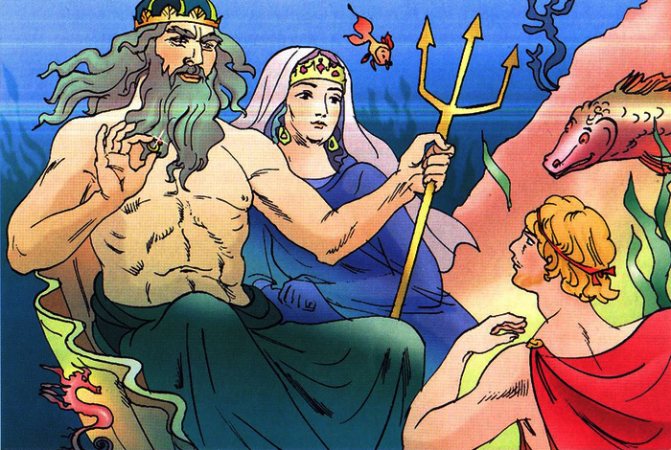

- If you are a son of Poseidon, prove it! - Minos took the ring off his finger and tossed it far into the sea. Immediately Theseus dove into the sea. Here the dark water had already covered the last ray of sunlight from him. "Help me, Father Poseidon!" - The young man mentally appealed to the god. Immediately he felt how the sea god Triton picked him up and carried him somewhere. Theseus woke up in the luxurious palace of the lord of the sea. Poseidon and his wife Amphitrida greeted him tenderly. And the young Nereids were already carrying the king's ring they had picked up on the waves. If I return to Athens with victory I will build a temple in your honour, O Poseidon.
Triton...Roda and Bentesikim... From Amphitrite. Ureus. Faunus. From Kirki. Phasos. (Version) Theak. From Kerkyra. Phineas. (version) Phoc. (version) Chios. From Chiona. Chrys. from Chrysogenia. Chthonium. From Sima. Aley. From Eurykida. Eocles. From Ascra. Ergin of Miletus. Eric. From Aphrodite (version). Telchins. (version) Kings of Atlantis. From Clito. Percy Jackson. By Sally Jackson. A total of about 130 children.
Spouses and lovers.
Poseidon and Amphitrite. Triumph of Neptune (Nicolas Poussin (1594-1665).
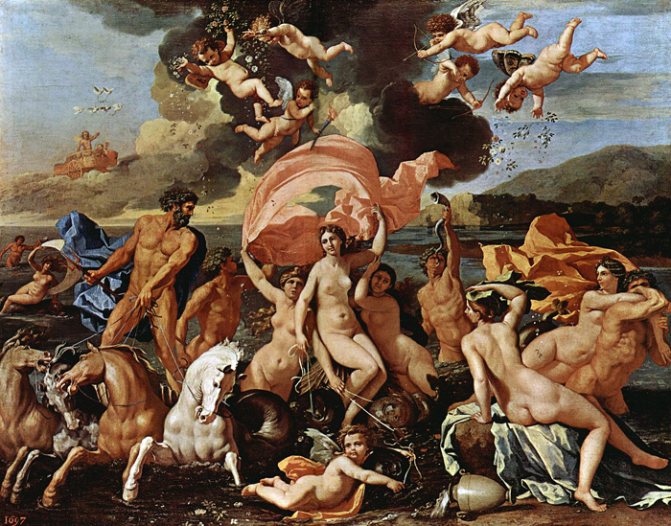

His spouses are called: Amphitrite, Beroea, Livia. He was rejected by: Asteria (version), Hestia, Coronida (who became a raven), Fetid. Lovers: Diopatra (an Ophrian nymph). Euboea. According to the version, the mother of the Curetes and Corybantes. Kenida (daughter of Elath). Poseidon turned her into a man. Skilla. Theia. Also his lover is called Pelopus. took the form of a bull when he lay with Arna the form of a horse - with Demeter the form of the river god Enipei - with Ithimedeia the ram - with Theophanes the bird - with Medusa Gorgon dolphin - with Melanthia Alopa
Epithets of Poseidon Amoebaeus. An epithet of Poseidon. Amphibian. Epithet of Poseidon. Asphaleus. A common epithet of Poseidon. His sanctuary was erected by the Rhodesians on a new island that emerged from the sea. Heliconius. Epithet of Poseidon by the Ionians. Temple at Helikos and altar at Miletus. Genetlius. (Genethlius.) An epithet of Poseidon. Hippius. ("Equestrian"). Epithet of Poseidon, as he first tamed the horse. Was the inventor of horseback riding. Either because he turned into a horse to possess Demeter. The altar at Athens. Mycenaean. i-qo ("horse"). en:Hippeis Kianohet ("black-haired one"). An epithet of Poseidon. A constant epithet in Homer, literally "with hair the color of the sea wave," in Zhukovsky "azure-crowned. Litei. "Resolver" Nickname of Poseidon in Thessaly. Melanthus. Epithet of Poseidon. Pater. Epithet of Poseidon at Eleusinus, there his temple. Patrogenius. Epithet of Poseidon. Pelagius. "The Sea." A common epithet of Poseidon. Profantus. Epithet of Poseidon in Furia. Samian. Epithet of Poseidon. Taurius. Epithet of Poseidon. Taraxippus. The name of Poseidon. Themius. Epithet of Poseidon. Phitalmius. ("Plant"). Epithet of Poseidon, temple at Tresen. Aegeus. (Aegeon.) A nickname of Poseidon. Ennosigeus. (At Stesichorus Ennosides) Epithet of Poseidon. In Mycenaean era e-ne-si-da-o-ne (Enesidaon). Enosichthon. "Earth wobbler." Epithet of Poseidon. Erechtheus. Epithet of Poseidon. Fagimasad is identified with him. Amaranth of Euboea, killed by Poseidon. From the wave. Hippolytus. God sent a bull that frightened the horses. Polybot (a giant). Eanthos Oylidus. The people of the Phlegians. Egeon (a giant). Erechtheus. King of Athens. See. Also Neptune Ulmo In literature and art Homer's XXII hymn and the XVII Orphic hymn are dedicated to him. Actor in Euripides' tragedy The Trojans, Aristophanes' comedy The Birds. Poseidon has blue eyes. Lord Poseidon appears in a series of fantasy novels by American writer Rick Riordan, Percy Jackson and the Olympians
Neptune
(Latin.
Neptunus
) - in Roman mythology, the god of the seas and streams. One of the most ancient Roman gods. Later was identified with the Greek god Poseidon. Neptune's wife was the goddess Salacia (Fetid, Amphitrite).
Poseidon and Amphitrite, 1516 (Mabuse (1478-1532).
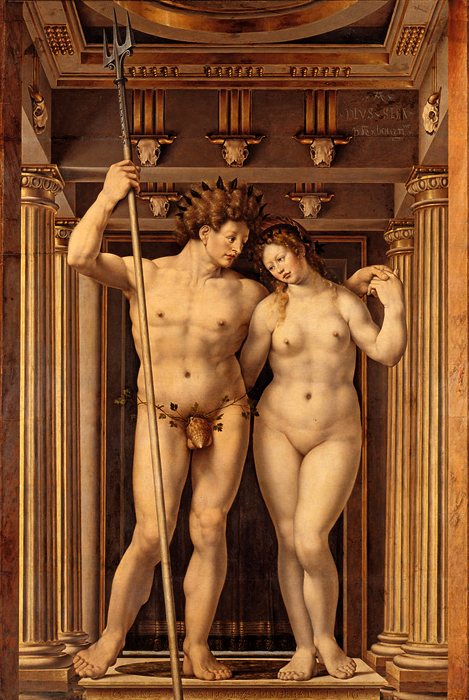

Neptune is associated with the feast of Neptunalia
which was celebrated on July 23rd. The festival was celebrated to prevent drought. During this festival huts of leaves were built. Sea Neptune was worshipped by people associated with the sea or going on a voyage to the sea.
In honor of the god Neptune is named the eighth and farthest planet in the solar system Neptune In heraldry
Neptune is depicted on the coat of arms of the city of Veliki Ustyug, the trident of Neptune - in the historic coat of arms of Feodosia (1811).
Poseidon and water deities
Before in water streamy rivers, continuously flowing, stepping foot, pray, looking at the beautiful streams, and many miles, bright water wash your hands. If you do not wash your hands, if you do not cleanse your soul, You will be punished by the River Gods, who will send a misfortune on your way.
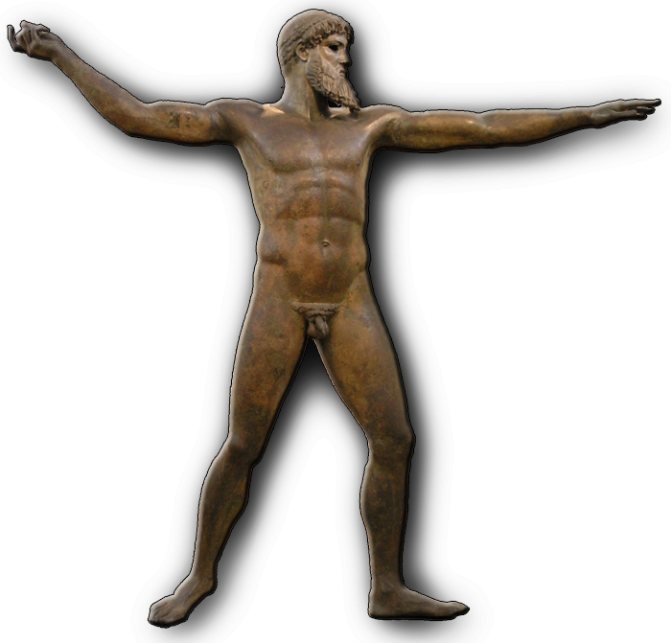

Deep in the depths of the sea stands the palace of Poseidon, who after defeating the titans gained an immense sea kingdom. Poseidon rules the seas, and the waves of the sea obey the movement of his arm armed with a fearsome trident. When the ruler of the sea swings the trident, the waves rise like mountains, covered with white foam ridges; when he lowers it, the storm dies down, and the blue, boundless sea splashes quietly near the shore. All the inhabitants of the sea-even the ancient sea deities-are subjects of Poseidon. The wisest among the old sea gods is Nereus ..
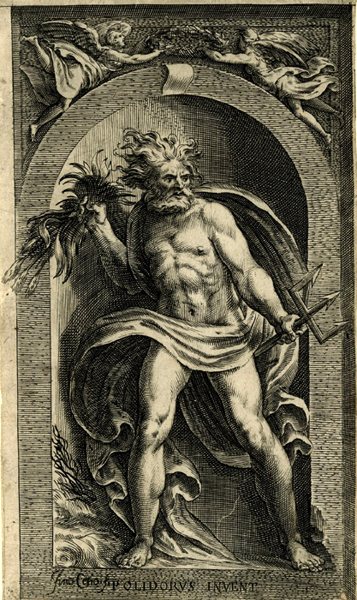

He knows all the secrets of the future. Nereus knows no lies or deceit, only the truth he reveals to the gods and mortals. Nereus had fifty beautiful daughters, the most beautiful was Amphitrite. One day Poseidon saw the young Amphitrite playing merrily with the incoming waves and he was enchanted by her. But she was frightened by the terrible sight of the sea god, and she ran away to the edge of the world, to the place where the Atlas titan held the heavens on his shoulders. Poseidon searched for a long time for his beautiful daughter Nereus until a dolphin showed him where Amphitrite had hidden. Amphitrite could not hide even at the edge of the world. The Lord of the Seas picked up the Nereid and drove her to his emerald-green palace in his chariot pulled by four snow-white horses that could fly through the air.
The Marriage of Poseidon and Amphitrite (1802-1805) Felice Giani (1758-1823)
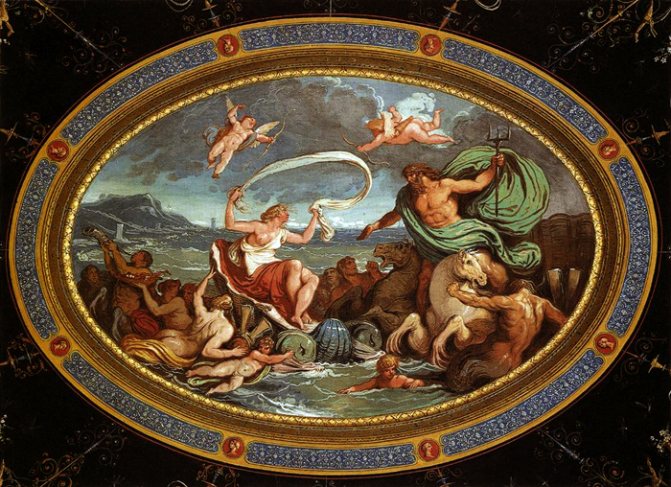

So Amphitrite became the wife of Poseidon and the goddess of the sea. Soon Amphitrite gave her husband a son, Triton.
Neptune and Amphitrite (Ricci Sebastiano, 1691-1694. Thyssen-Bornemis Museum, Madrid).
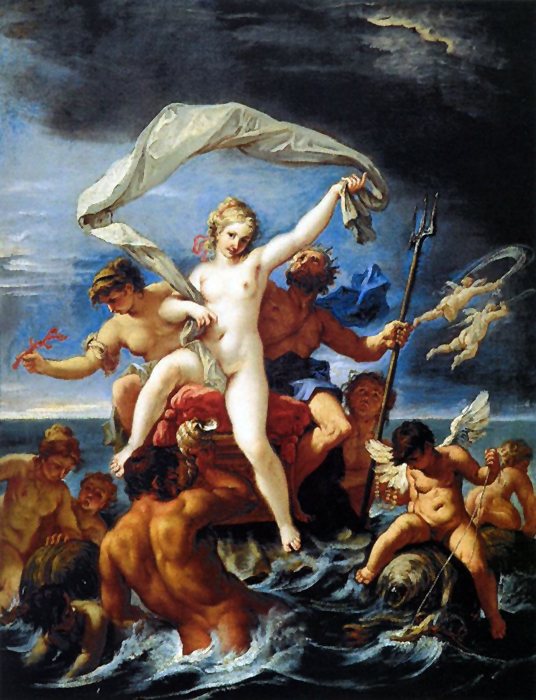

Triton liked to live not in his father's palace, but in the most inaccessible depths of the sea. He rarely showed himself not only to people, but also to his parents. Triton was ashamed of his appearance: a wide fish-like mouth with long, protruding fangs, gills instead of ears, his body overgrown with shells, and a dolphin's tail instead of legs.
Boris Vallejo - Triton and the Nereid
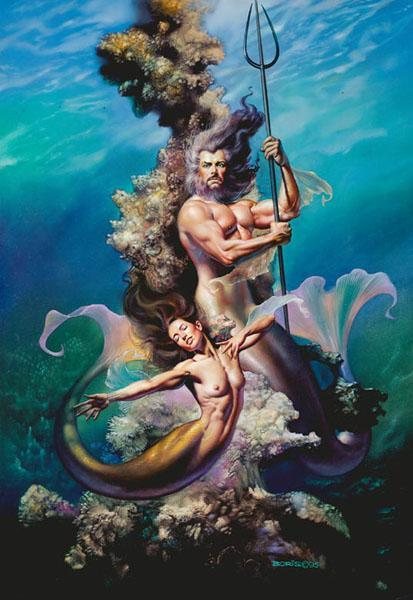

Son of Poseidon was able to cause a storm at sea no less than his father with a wave of his trident. As soon as Triton blew into his magic shell, a fierce wind swept in and a storm began. Sure death awaited the sailors who did not have time to find a quiet bay in such weather. Poseidon, like his own brother Zeus, did not consider it necessary for himself to remain faithful to his wife. Goddesses, titanides, nymphs, and mere mortal women had innumerable children by the sea god.
Venus between Mars and Neptune (Gianbattista Zelotti (Farinati), 1555 Venice, Palazzo Ducale)
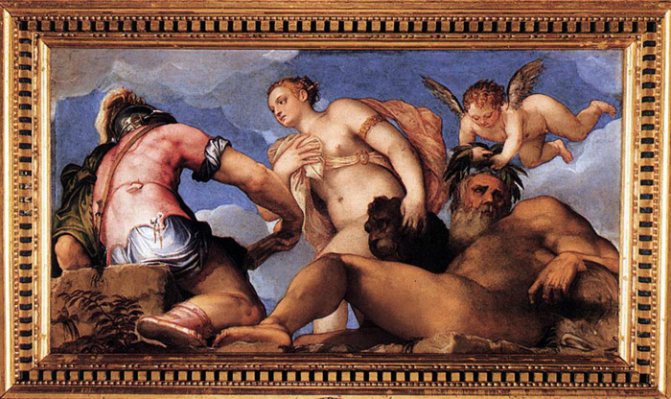

Even Gaia-Earth herself had from him a son, Antaeus, whom no one could defeat as long as he was in contact with the earth that gave birth to him. The bloodthirsty Egyptian king Busiris, who killed all the foreigners who got into Egypt, the leader of the tribe of bebricks the unsurpassed fist fighter Amik, the robber Skiron, nicknamed the Sosso-bender, the Cyclops Polyphemus, were also the sons of the lord of the seas. Is it possible to name all the children of Poseidon...
Poseidon (Sochi, Russia)
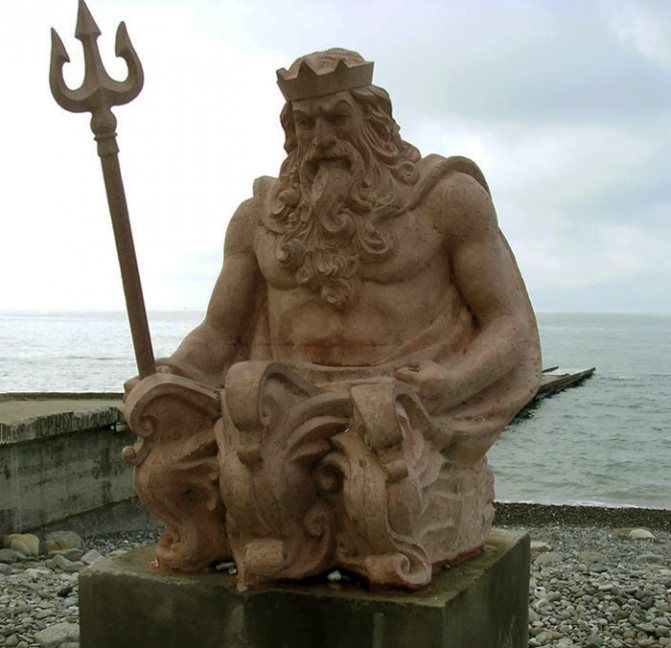

The entire Hellenic world revered the mighty sea god. In the port cities and the smallest of the fishing villages, on islands and capes there were majestic temples dedicated to Poseidon, in which people living by the sea, brought sacrifices to the god and prayed to him. The temple of Poseidon on the Cape of Sunion is a temple of the same name, the temple of Poseidon on the Cape of Sunion.
The temple of Poseidon at Cape Sunion
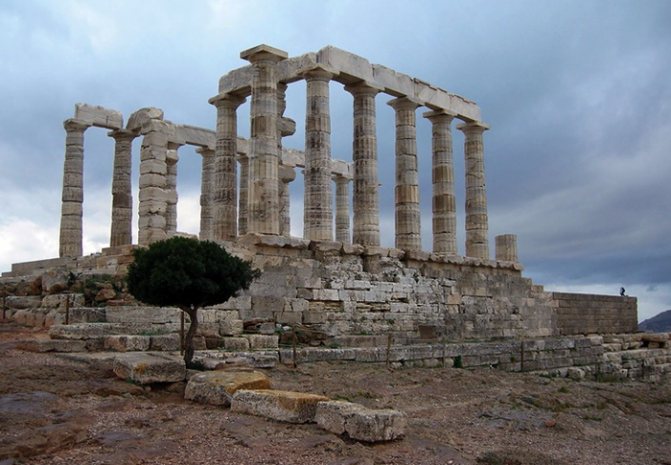

One day a girl called Amimona took a jug of water. There was a terrible drought and all the springs dried up. Exhausted by the heat and the long journey, the girl fell asleep under a tree. She was awakened by the crackling of dry branches. Amimona opened her eyes and saw a deer grazing nearby. "You can't miss such magnificent prey," she thought, drew her bow, which she never parted with, and fired a light arrow straight into the deer's neck. But the arrow missed, flew into the thicket, and hit the sleeping satyr. The wounded satyr roared and rushed towards Amimona to tear her apart. The girl's legs trembled with fear, and she had only the strength to cry out: "Save, Poseidon!" Immediately the Lord of the Water appeared between Amimona and Satyr.
Neptune and Amimona (Carle van Loo)
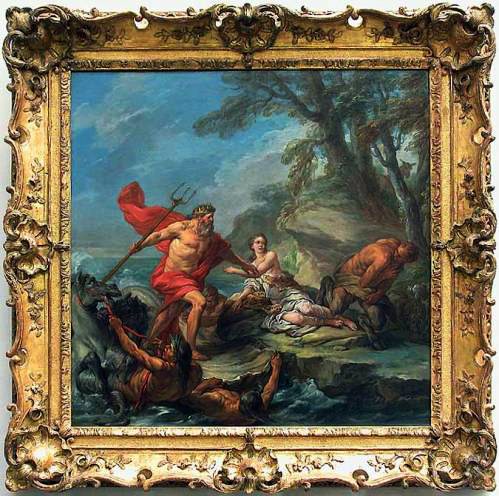

He hurled his trident at the forest beast with such force that the god's formidable weapon, piercing through the satyr's body, plunged into the granite rock. "What are you doing alone in these desolate places?" - Poseidon asked Animon. Stammering with horror, Amimona replied, "I was looking for some water. My father, my sisters are dying of thirst." - "Go to the rock and pluck my trident from the stone," commanded Poseidon. As soon as Amimona obeyed the god's command, a spring of clean, cold water gushed forth from the granite rock. Poseidon was undoubtedly the greatest and most powerful lord of the water element, but he was not the only one. On the southern seas lived the wise Proteus. He tended Poseidon's herds of seals and was considered a mere subject of Poseidon.
Aristaeus, tying the sea god Proteus to a rock to discover his future (Sébastien Slodz, 1688-1723)
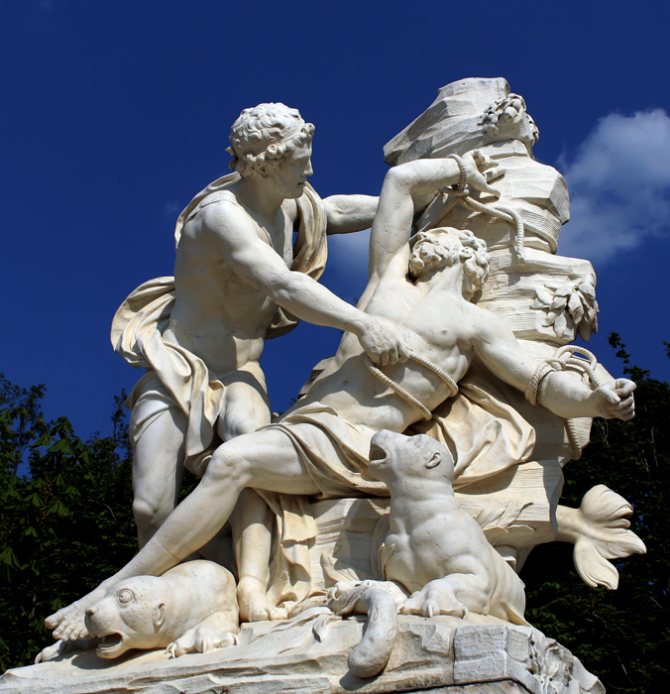

Proteus was rude and unsociable, and if he ever helped anyone, it was only when he wanted it himself. And yet the people worshipped him as a god because he knew everything that was going to happen in the future. Every day at noon, Proteus left the depths of the sea to take a nap in some grotto on the coast. Then he could be caught. But it took a lot of strength and courage, because Proteus was able to change his appearance and turn into a lion, a snake, could spread water, glow like fire, to become a tree, then a rock. It was necessary to hold Proteus tightly, squeezing him more and more, and not to be afraid of anything. Having exhausted his powers, Proteus reluctantly agreed to predict the future or give good advice. This is what people honored him for. When the sea is calm and the blue distance cloudless, then you could see Glavka - deity of all fishermen. He was once a man. One day he was walking by the sea and noticed that the fish, which the wave throws on shore, gain new strength and go back into the sea. Glavk guessed that the grass growing on that shore had some miraculous properties. Glavk plucked a bundle of grass, chewed it, and an irresistible desire seized him to throw himself into the sea and stay there forever. The waves gently embraced him, and Glavk became a deity of fishermen and sailors. Across the seas Glaucus searched for a worthy spouse and his choice was the beautiful nymph Scylla, daughter of the sea demon Phorkias. But Scylla did not return Glaucus' favor.
Glaucus and Scylla
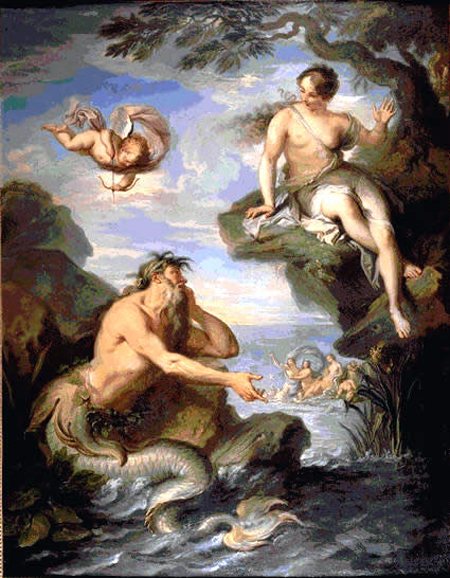

Glaucus then set out to the sorceress Kirk to get a potion from her that would help him win over the nymph. But so handsome and slender was the god of fishermen that Kirka herself fell in love with him. She gave Glavk a sealed jug and told him to pour its contents into the spring in which Skillah always bathed. How could Glavk know what kind of a potion Kirka poured into the jug... Glavk poured the dark, smelly liquid into the spring, and as soon as Scylla entered the water, the hideous monsters clung to her body. The frightened nymph rushed into her native sea element to wash away the vile creatures with salt water, but they grew on her and became an integral part of her. The enchantments of the jealous sorceress Kirki turned the beautiful Skilla into a sea monster. The daughter of Forky grew twelve predatory paws, six disgusting heads on long necks, and in each mouth three rows of sharp teeth sparkled. It settled on the shore of Sicily, in a rocky cave above a narrow strait. In winter and summer an impenetrable cloud hung over Scilla's lair. Neither the nimble boat, nor the swift fifty-weight ship could safely pass this terrible place - the monster always managed to kidnap and swallow several sailors.
Leucothea, 1862 (Jean Jules Allasseur (1818-1903)
The goddess who saved sailors in distress was Leucothea. She, like Glaucus, had once lived on land, but, fleeing from her husband who had fallen into madness, she plunged into the depths of the sea with her son Melikert in her arms. Poseidon prevented them from perishing by making them virtuous sea deities. It was said that somewhere far to the west, in the depths of the sea, lived Pontus, the ancient sea god, and the gray-haired titan Ocean. These gods had been worshipped in times immemorial by distant ancestors. They were forgotten after Zeus defeated the titan gods. The Olympus Lord did not throw the old gods of the sea into the abyss of Tartarus, as he had done with the other titans. He did not remember at all about Pontus, as if he did not exist at all, and Zeus made the elder of the Ocean god of the great river, which washes the whole earth around.
Neptune and the Dolphin (Gianlorenzo Bernini, 1620-80) Los Angeles, Paul Getty Museum
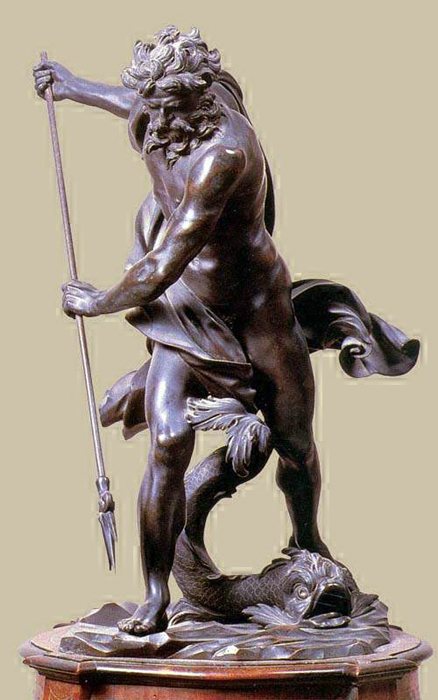

All rivers, even in the depths of the earth are connected to the sea, the domain of Poseidon, so all river deities are subjects of the god of the seas. Every river, even the smallest, even the weakest stream has its divine patron, who, surrounded by nymphs and naiads, governs the running of its waters, establishes and changes their course. The people held the river deities in reverence. To them, as to the formidable gods of the sea, temples were erected and altars were set up.
Crane Walter - The Horses of Neptune (1893)
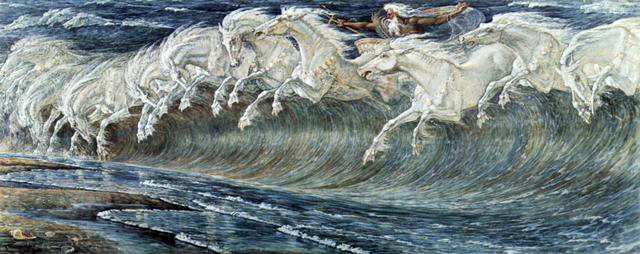

Poseidon (Antique mosaic, Mosaic floor from the Baths of Neptune at Ostia, c. 133 AD)
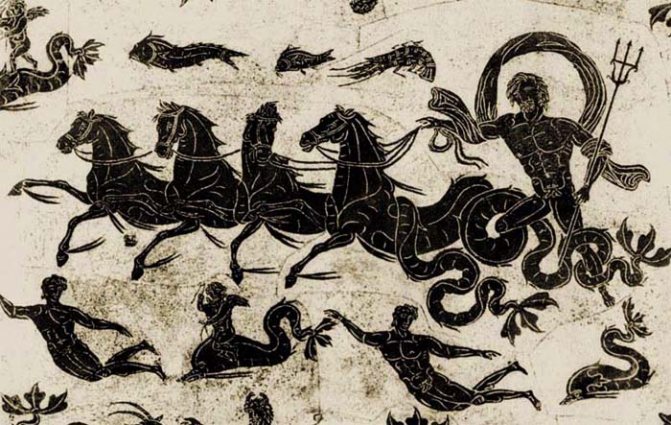

The series of posts "Myths of ancient Greece 1":
Part 1 - Myths and Legends * Pygmalion and Galatea Part 2 - Myths and Legends * Orpheus and Eurydice ... Part 32 - Myths and Legends * Dionysus Part 33 - Myths and Legends * Charitas (Graces) Part 34 - Myths and Legends * Poseidon (Neptune) Part 35 - Myths and Legends * Andromeda Part 36 - Myths and Legends * Medea ... Part 47 - Myths and Legends * Europe Part 48 - Myths and Legends * Hephaestus Part 49 - Myths and Legends * Hera
Private Collections
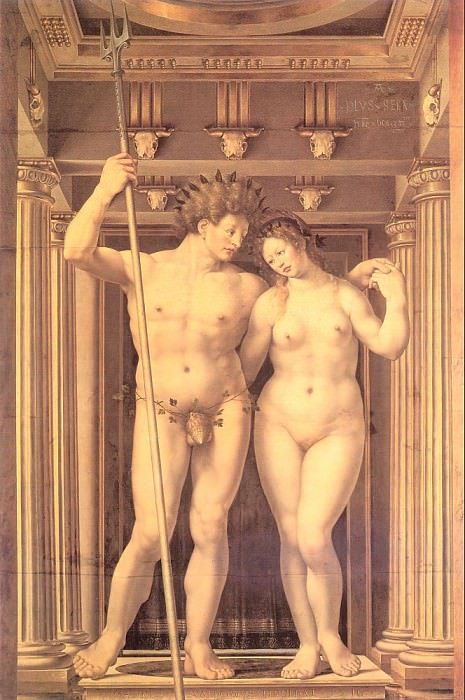

Neptune and Amphitrite, 1516. Mabuse Jan Gossart. Private Collection
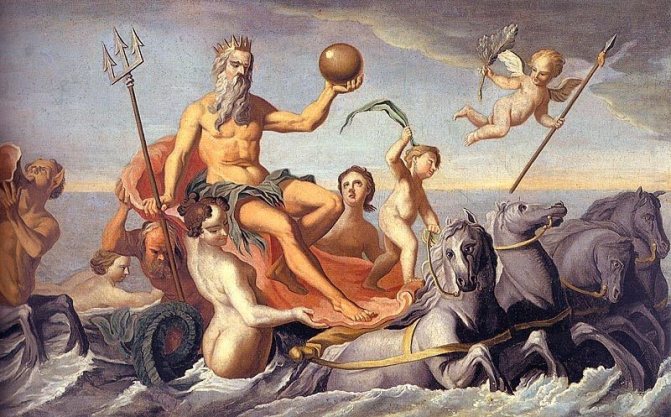

Return of Neptune. J. S. Copley. 1754. Private Collection, United States.


Frans Franken the Younger. Triumph of Neptune. Private Collection.
George Frederick Watts. Neptune's Horses. Private Collection.


Michael Caluta. Behind the Throne of Neptune. Private Collection.
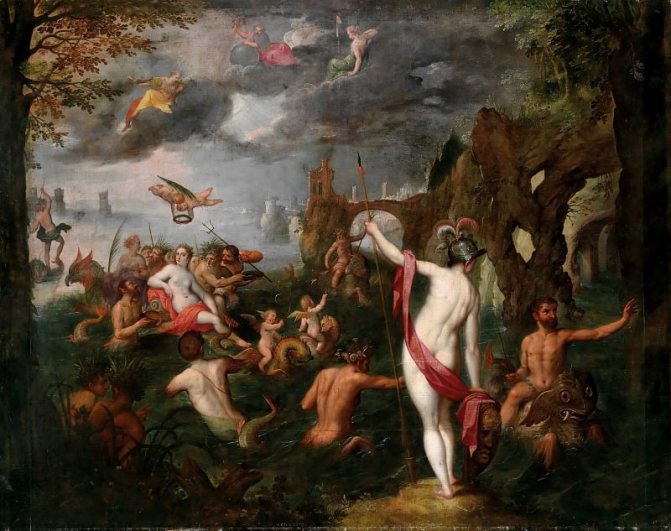

Jan Breughel the Elder. The Wedding of Poseidon and Amphitrite. Private collection.
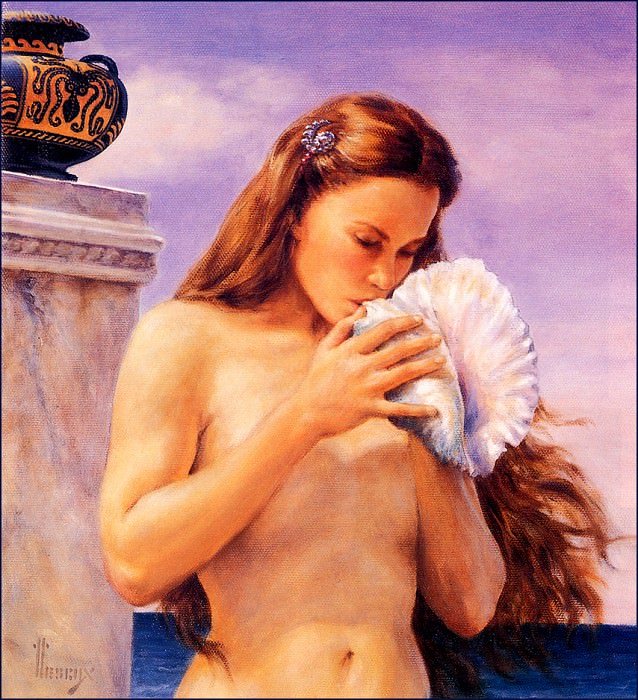

Daughter of Poseidon, Richard Hescox. Private collection, United States.
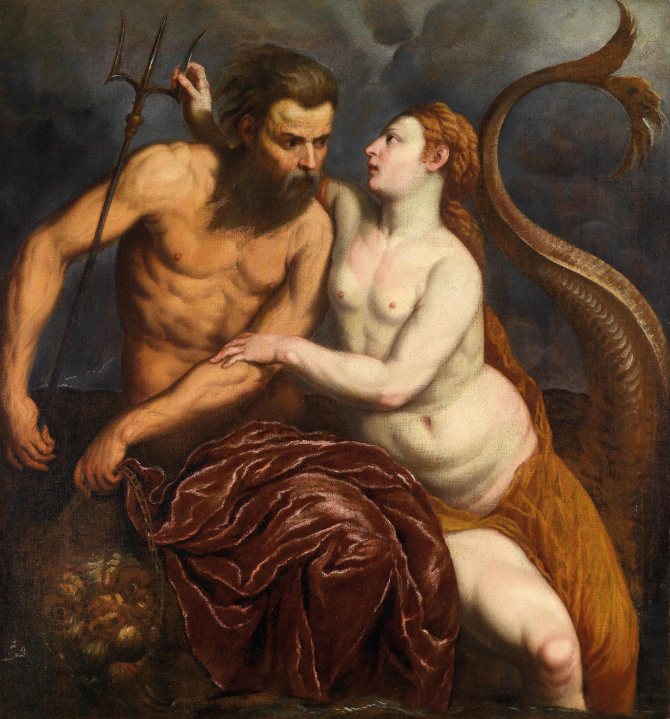

Neptune and Amphitrite. Paris Bordone, ca. 1560. Private collection.


Crane Walter, Horses of Neptune, 1892.
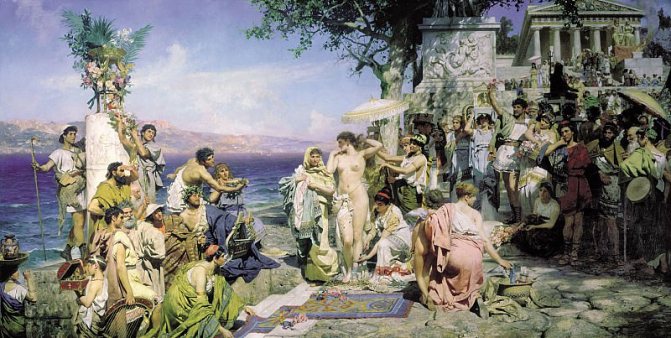

Frina at the Feast of Poseidon at Eleusinus 1889, unknown Russian artist
Names and nicknames of Poseidon
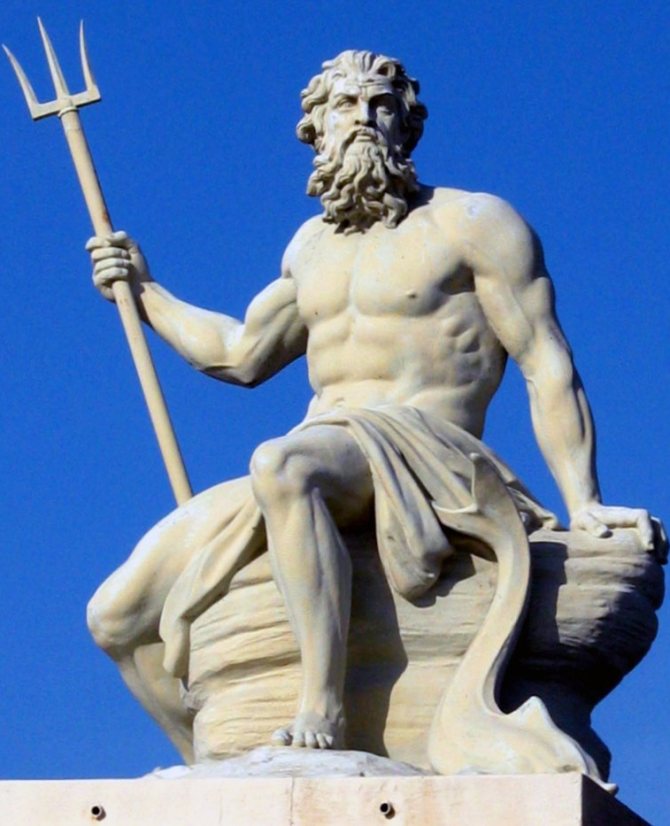

In different authors, different peoples and in different lands Poseidon was called differently:
- The Ionians called him Heliconium after the temple on Mount Helicon;
- Since it is believed that it was Poseidon who first tamed the wild horse, he is called the Equestrian or the Mounted, and in Athens and Miletus there are temples dedicated to the God the Mounted;
- The great blind man, Homer, calls God a lord with hair the color of the sea wave; and V.A. Zhukovsky calls him in his works the Azure-faced, the Blue-crowned;
- In Thessaly, where earthquakes were frequent, he was called the Destroyer;
- In Elephsine, where one of the chief temples of God is situated, he is called Consort of the Nymphs or Driver of the Nymphs, because he often had love affairs with them;
- In Athens, on the other hand, he was called the Shaker of the earth and the Breaker. These are the most frequent names and nicknames of the great sea god.
The main seat of Poseidon was the mysterious Atlantis, here he was the absolute ruler, and the Atlanteans were happy to submit to their sea lord. But even in ancient Greek myths there is no explanation as to why Atlantis was destroyed and annihilated. Although there are some hints that Atlantis was destroyed by Zeus, during the war between Poseidon and Athena, to protect his daughter and point out to his rebellious brother who is the true ruler of the world.
Athena
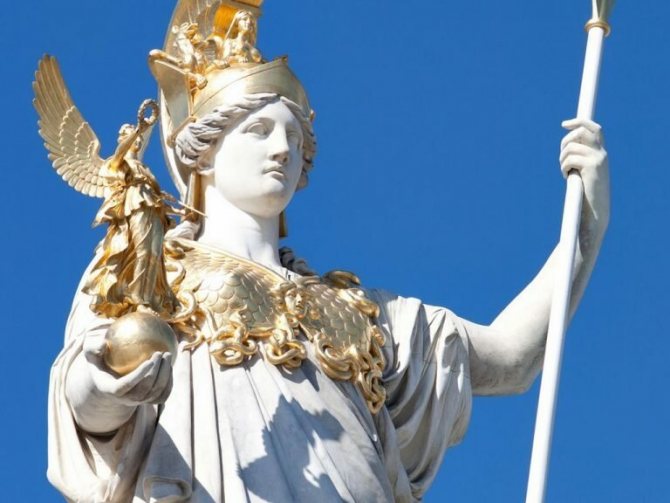

0
Athena's birth was very unusual. One day Zeus began to be plagued by severe headaches. To relieve the thunderer's suffering the god Hephaestus hits him on the head with an axe. A beautiful maiden in armour and with a spear emerges from the wound. Zeus, seeing his daughter, is very happy. The newborn goddess was named Athena. She became her father's chief helper - the guardian of law and order and the personification of wisdom. Formally Athena's mother was Metida, imprisoned within Zeus. Since warlike Athena embodied both the feminine and the masculine, she did not need a spouse and remained a virgin. The goddess patronized warriors and heroes, but only those who wisely wielded their power. Thus, the goddess balanced the rampage of her bloodthirsty brother Ares.
Hestia
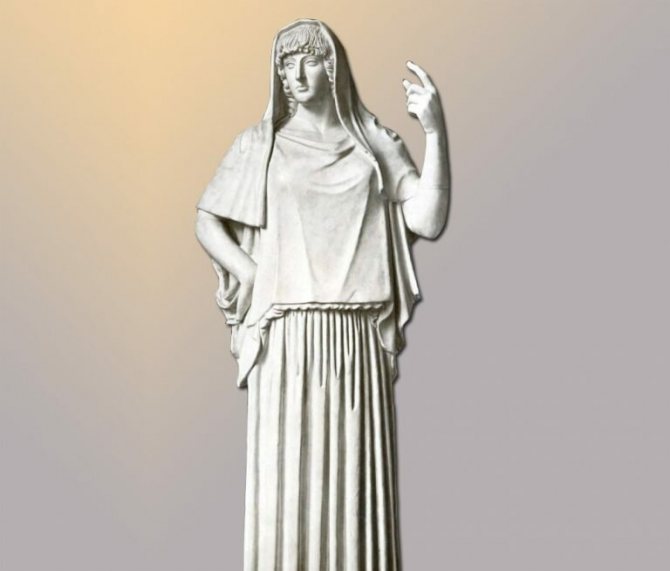

0
Unlike most of the violent and vengeful Olympians, Hestia, Zeus' older sister, was of a peaceful and quiet disposition. The Greeks worshipped her as the keeper of the home and sacred fire. Hestia practiced chastity and rejected all the gods who proposed marriage to her. The cult of Hestia was very widespread in Greece. She was believed to help conduct sacred ceremonies and keep peace in families.
Hephaestus
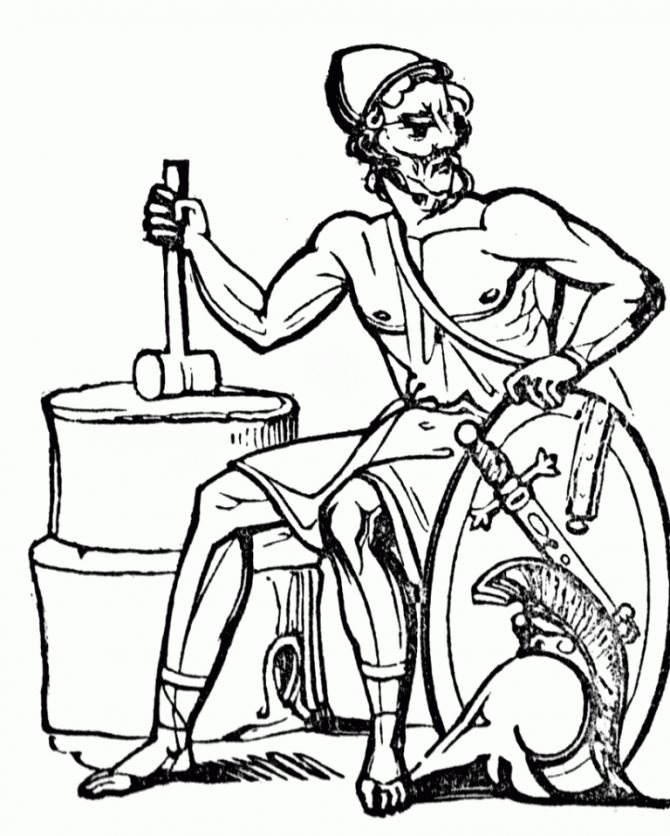

0
Hephaestus, the patron saint of smithing, crafts and fire, was the son of Zeus and Hera. He was born with a limp on both legs. Hera disliked the ugly and sickly infant, so she threw him down from Olympus. Hephaestus fell into the sea, where Thetis picked him up. On the seabed, Hephaestus mastered the blacksmith's trade and began to forge wonderful things. To the Greeks, Hephaestus, thrown down from Mount Olympus, represented an ugly but very intelligent and kind god who helped all who turned to him. To teach his mother a lesson, Hephaestus forged a golden throne for her. When Hera sat down on it, fetters closed around her hands and feet that none of the gods were able to undo. Despite all entreaties, Hephaestus stubbornly refused to go to Olympus to free Hera. Only Dionysus, who intoxicated Hephaestus, managed to bring the smith-god. After Hephaestus was freed, she recognized her son and gave him Aphrodite as a wife. But Hephaestus did not live long with his unfaithful wife and contracted a second marriage to Aglaia, the goddess of goodness and joy. Hephaestus is the only Olympian who is constantly busy working. He forges lightning bolts for Zeus, magic objects, armor and weapons. From his mother he, like Ares, has inherited some chthonic traits, but not so destructive. Hephaestus' connection to the underworld is underlined by his fiery nature. However, the fire of Hephaestus is not a destructive flame, but a domestic hearth that heats people, or a forge with which many useful things can be made.



